#adult post-apocalyptic author
Explore tagged Tumblr posts
Note
what’s your favourite book?

Everyone should reblog this!!! But....
Have you ever heard of that epic sci-fi LGBTQ+ adventure novel titled, Phoenix Undying?? Omg it's a sapphic mess tossed into a post apocalyptic future with mutated giant lizards, airships, sky pirates and sexy characters. With a wild badass immortal anti-hero named, Phoenix who seriously needs to get her shit together. When suddenly she gets herself into a situation she never asked for. Randomly becomes responsible for an 11 year old orphan boy with psychic abilities, is asked to help eradicate humanity by an ethereal being just to save the planet from their destruction and all for the exchange to end her tormented immortal life. 😌❤
The author is a crazy lesbian chick! She painted an illustration for each chapter. She is absolutely insane and kinda bad at writing but her story is totally the best. (Maybe.) So If you like dumb cringy humor and badass women and sexy villains, give it a read! 😉🌹
You can order it on Amazon for like $2 because she practically wants to give it away for free. Sometimes she does! It's that good. And if you don't like the story you can at least enjoy the art. 😌
Amazon: US Link but you can also find it in other countries. Give it a search. ⭐⭐⭐⭐⭐ Stars. Lol
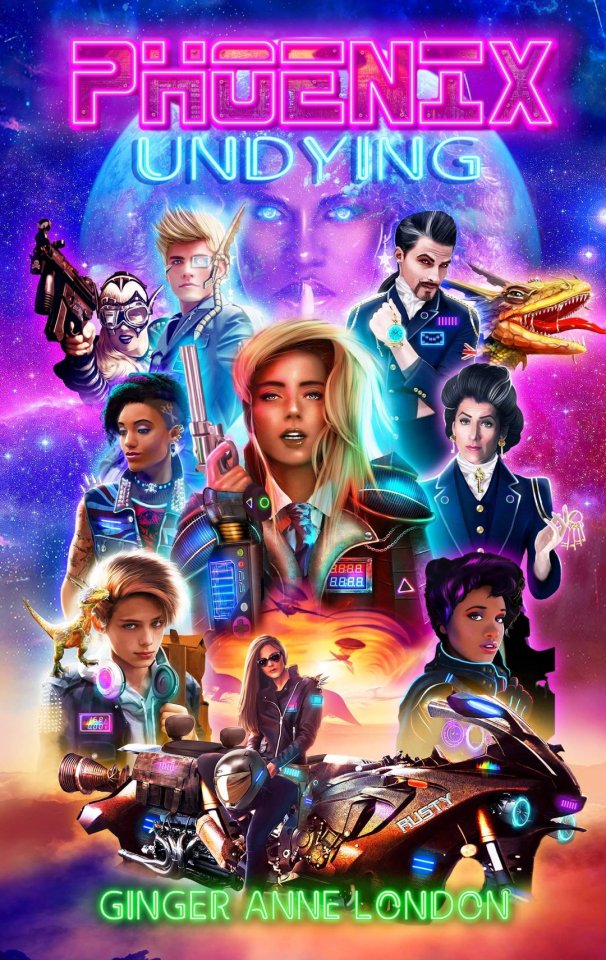

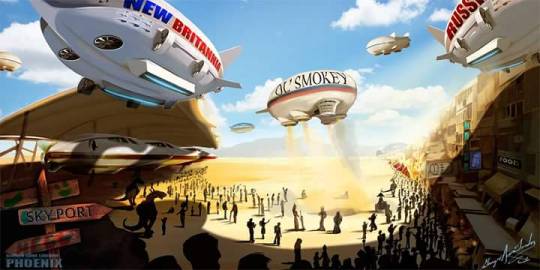
#I totally did NOT just plug my own novel that is burried under millions of others.#Phoenix Undying#lgbtq#lgbtq books#scifi books#Lesbian books#bisexual books#post apocalyptic#adventure#book#novel#ya novels#New Adult#banned books#indie author
12 notes
·
View notes
Text
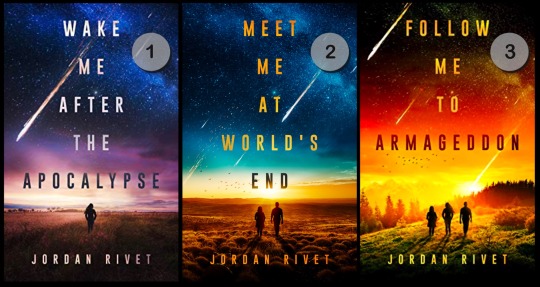
Series Recommendation:
Bunker Series - Jordan Rivet
Wake Me After the Apocalypse (Bunker #1)
Meet Me at World’s End (Bunker #2)
Follow Me to Armageddon (Bunker #3)
Genres: Science Fiction, Young Adult+, Post-Apocalyptic
Keywords: Survival, Cryosleep, Strong Female Characters, Lots of Characters, Romantic Subplots
Length: Long
Rating: #1 - 4/5, #2 - 4/5, #3 - 4/5 : Overall - 4/5
Find on Goodreads:
#bunker series#Jordan rivet#wake me after the apocalypse#meet me at world’s end#follow me to Armageddon#book recommendations#authors#books#what to read next#what to read#books & libraries#science fiction#young adult#post apocalyptic#survival#strong female characters#lots of characters#romantic subplots#Joanna Murphy#Charlotte Hartland
4 notes
·
View notes
Text
Book Review: Blood Circus
Title: Blood Circus Author: Camila Victoire Genre: Post-Apocalytpic, Dystopian, Young Adult, Fantasy Rating: 5 Stars Description/Synopsis: At the end of the twenty-first century, climate change and famine almost ended humanity—until the discovery of the Klujns, a barbaric, humanoid species with strangely colored eyes and even stranger abilities. Their crystal claws and bones fertilize barren…

View On WordPress
#author#authorunpublished#blood circus#book#camila victoire#dystopian#fantasy#post-apocalyptic#review#unpublished#ya#young adult
2 notes
·
View notes
Text
Dominion of the Star (Descendants of the Fallen Book 1) by Angelica Clyman | Book Review of a Thought-Provoking Post-Apocalyptic Tale
Today I have a review of Dominion of the Star, Book 1 of the Descendants of the Fallen, by Angelica Clyman. Almost eighteen years have passed since the Eclipse changed the Earth forever, and Sebastian Za’in rose from the chaos and seized control, imposing his order on the broken planet. In a world ruled by fear and superstition, where all gods have perished, there is no one who can stand up to Za’in, the man rumored to be one of the Nephilim—hybrid offspring of Angel and Man. In a few short months, another Eclipse will occur, and while there are those who expect a new natural disaster, Za’in has plans of his own . . . Completely unaware of this global turmoil, Kayla Steelryn has spent most of her life in a quiet village, longing to uncover her hidden past. When she leaves her home in search of answers, she finds herself faced with the truth about her identity, forced to choose between the two men she loves, and thrust into a conflict where she alone has the power to stop an event more disastrous than the end of the world. Fans of post-apocalyptic fiction, especially those interested in exploring spirituality and philosophy within the genre, will find elements to appreciate in this book. #Fantasy #Dystopia #PostApocalyptic Dominion of the Star (Descendants of the Fallen Book 1) by Angelica Clyman | Book Review of a Thought-Provoking Post-Apocalyptic Tale
Dominion of the Star (Descendants of the Fallen Book 1) by Angelica Clyman | Book Review of a Thought-Provoking Post-Apocalyptic Tale Book Details ~~~~~~~~~~~~~~~~~~~~ Purchase Links for Dominion of the Star Amazon-OneLink for all countries ~~~~~~~~~~~~~~~~~~~~ My thoughts on Dominion of the Star “Dominion of the Star” by Angelica Clyman is a post-apocalyptic novel that immerses readers in a…

View On WordPress
0 notes
Text
Pinch hits time! Are any of these you?

Hello hello hello! What's that? I was just here? Well we had a bunch of writer's lives explode, so I am here again, hoping that your life is a little less "my computer bluescreened" and a little more "I would love to take on a recreational deadline".
We have three FOUR ONE pinch hits outstanding! They are
PH20 is a Dream SMP bedrock bros au! Focusing on Technoblade and Tommyinnit, this is a Sweet Tooth (Netflix Series) AU, which is a Minor Post-Apocalyptic AU, Minor Hybrid AU. The artist is a minor who is open to working with all ages, and they are open to Graphic Depictions of Violence and a wide range of fandom themes, from fluff to child abuse to adoption to kidnapping to lgbtqia headcanons. Full creative options! CLAIMED
PH21 is a dream SMP au focusing on Tommyinnit and Niki Nihachu— either together (platonically) or separately! It's a hunger game au, the artist is a minor who is open to working with all ages, and they opted into graphic depictions of violence, major character death, AND unhappy endings, so you can go fully hunger games if you want, (as long as you don't make tommy or niki siblings, as the artist did say they didn't want that). CLAIMED
PH22 is a QSMP au focusing on Chayanne and Tallulah! It's a paper mario au, and the artist is an adult who is open to working with all ages. The author doesn't want any major archive warnings on the work, but they did opt into adoption and foster narratives, fluff, lgbtqia headcanons, family dynamics, and more, so you can do some fantastic kidfic with this. CLAIMED
PH23 is a DSMP au focusing on Tommyinnit & Technoblade! It's a spy au with a steampunkish setting, and there are an awesome seven panels to this comic art piece. The artist is minor who is open to working with all ages, and they opted into graphic depictions of violence for major archive warnings, and for fandom themes they okayed alcoholism, drug use, family dynamic and fluff, for a full spectrum of options on how to take this! (Though the artist has requested that it not get darker than exile arc, for a benchmark). CLAIMED
The expectation for these fics is 5k each. We will automatically offer an extension to August 2nd, but greater extensions are available if you think you can take it. If you are interested any of these pieces, (or to look at the art in detail), join the discord and talk to one of the mods!
#bedrock bros#tommyinnit#dream smp#dsmp#dsmpblr#technoblade#niki nihachu#qsmpblr#qsmp#qsmp chayanne#chayanne#qsmp tallulah#qsmp lullah#tallulah the egg#pinch hitters
198 notes
·
View notes
Text
If you're a SFF reader who's wanting to read more Palestinian fiction, check out this #ReadPalestinianSpecFic resource, a big list of books, poetry, short fiction, and comics by Palestinian authors.
a couple I have read previously:
Nayra and the Djinn - MG fantasy graphic novel
Zenith - free short comic, a post-apocalyptic adventure about the phases of the moon, Islamic futures, and asserting your identity
(by the same artist as above, Being is an itch.io game + comic that looks interesting)
Squire - YA fantasy graphic novel about knights and imperialism
Munera and the Moon - free short story about a djinn and a ghost
The Mandrake Loves The Olive - in Xenocultivars anthology, but is also available separately. a queerplatonic tale inspired by Palestinian herbal folklore.
From Whole Cloth - short story about an ace prince & storyteller negotiating a relationship
Which One Is Meat? - a free spooky magical short comic
The Sentient - adult sci-fi about clones, cults, consciousness and coming to terms with the past
(read nonfiction and realistic fiction too, but perhaps this is somewhere to start)
548 notes
·
View notes
Text
joel miller fic recs
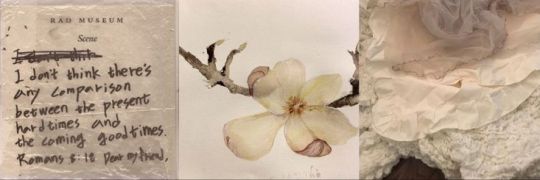
you are responsible for the content you consume‼️
✧*:·˚ hi everyone!! here is a list of all the fics that are my favs with tagged writers/authors ✧*:·˚
✧*:·˚ remember to like and reblog the works you enjoy in order to support each writer!! ✧*:·˚
✧*:·˚ however, make sure you read the information on each story themselves such as triggers & warnings ✧*:·˚
✧*:·˚ also, if you'd like me to remove your fic from this list, message me! ✧*:·˚
°。°。°。°。°。°。°。°。°。°。°。°。°。°。
*✧* for you, anything by @mellowsaturns joel miller x reader | fluff, soft!joel, domesticity, established relationship, reader caught a cold, sick fic
-joel do what he does best, smuggling and taking care of you
*✧* good thing by @pedros-mustache joel miller x fem!reader | smut (18+ only). also: established relationship, angst, non-planned pregnancy, implied sex-for-pay, age gap, language, 4k
-“how long have you known?”
*✧* i'm right here by @orangevtae joel miller x fem!reader x platonic!ellie williams | reader uses she/her pronouns, mentions to panick attacks and PTSD's, reader is seen like a mother figure to ellie, hurt/comfort, death and blood (typical TLOU thing), joel and reader are in a stabilished relationship, slight mentions to episode 4
-ellie needs reassurance that you are alive and well after an infected surprise attack while you were taking a walk with her
*✧* hopelessly devoted to you by @omg-foreverfilledwithweird-posts joel miller x fem!reader | SMUT 18+, fluff, AGE GAP (reader is late twenties, joel is like 56), language, near death experience, violence, oral f receiving, p in v penetration, unprotected sex, enemies to lovers ish, just filth, daddy kink, slight angst, mentions of death, injuries, tending wounds, rough!Joel, dom!joel
-you’ve been by ellie’s side since she was little, a family figure and her protector, after both of your families passed away and you found one another in the qz. so, when the gruff and demanding joel miller steps into the picture to take you both to the lab ellie needs, the two of you don’t see eye to eye. but after time passes, attraction settles in and you and Joel might feel more for the other than you thought.
*✧* faithful by @mypoisonedvine joel miller x reader | smut (18+ only; oral f receiving, unprotected sex, very slight dacryphilia kinda?, a touch of degradation and dumbification in there, and virginity loss with some pain and one mention of blood), heavy age gap (not specified but the reader is absolutely an adult), insecure crybaby reader, unrequited love/pining, reader wants to fuck joel so bad it makes her look stupid (and we love that for her cause same), angst, tess getting kinda screwed over but only because it's absolutely necessary for the plot, emotionally repressed joel, mention of reader's parents being deceased (implied to be infected), 9.2k
-joel wasn't looking for a follower, or a protégé, or an employee— whatever you're supposed to be— when he saved some dumbass kid from a couple runners. but he ended up with you anyways, and you swore to always be faithful to him... in every way.
*✧* a warm bed by @guess-my-next-obsession joel miller x fem!reader | E (18+ only, mature descriptions of death/apocalyptic life, blurry infidelity, unprotected PIV, dirty talk, cum play), 3.4k
-it was freezing out today in boston but you didn’t notice, not with the flames that burned beside you as you hoisted dead child after dead child into the makeshift mass crematorium.
*✧* joel fic by @forever-rogue joel miller x fem!reader | 2.3k
-people always seemed to call you shy.
*✧* joel fic by @forever-rogue joel miller x fem!reader | language; tlou typical violence, 3.4k
-“do you really think this place is safe?”
*✧* first time by @charnelhouse joel miller x fem!reader |
-"i can't," you gasp, nails biting into his shoulders. "it's-fuck-too much-too much."
*✧* crazy love by @cowgurrrl joel miller x fem!reader (plus platonic fem!reader x ellie williams) | mentions of david, nightmares, a panic attack, 1.3k
-ellie has a nightmare and you and Joel help calm her down
*✧* safe with you by @flightlessangelwings joel miller x fem!reader | established relationship, protective!joel, hurt/comfort, attempted harassment, choking (the non-sexy kind), minor character death, feelings, fluff, tommy’s the best wingman, support from Ellie, no use of y/n, 2.8k
-the bar bustled with life as you made your way through the crowd. you carried as many beers as you could at a time for the group that had arrived in jackson earlier that day.
*✧* his protection by @absurdthirst joel miller x fem!reader | post apocalyptic violence, mentions of gun violence, mentions of blood, murder, torture, gore, rough sex, unprotected sex, kidnapping, imprisonment, threats of cannibalism, unhinged delusions of grandeur, fire, being restrained, allusions to sexual assault, 5.2k
-when david's group takes you and ellie to their settlement, you warn them that joel will come for you. knowing that he will do whatever it takes to get back those under his protection.
*✧* teamwork by @allfoolsinluv crave!joel miller x fem!reader x tess servopoulos | explicit, 18+ only. Minors DNI, established poly relationship, m/f/f dynamics, age gap (reader's in her 20s, Joel & tess are in their 40s), unprotected p-in-v (wrap it up folks), dirty talk, praise, low-key dom/sub undertones, nipple play, fingering (f receiving), language, 1.2k
-did you come already?, spread your legs for (me), I want to see you
*✧* joel blurb by @sprout-fics joel miller x gn!reader
-"get inside."
*✧* a part of you, a part of me by @apollyonsdarksecrets joel miller x fem!reader | 18+ minors DNI. smut, unplanned pregnancy, crying, fluff, pre-outbreak joel. established relationship, cream pie, pet names, cussing, pregnancy tests, just a bunch of happiness because that’s all joel deserves in this world.
-joel’s been down this road before, he’s seen all the signs, and he knows before you ever do that you’re pregnant.
*✧* on his backseat by @causeimhappinesss joel miller x gn!reader | smut, age gap (reader in her 20s), unprotected sex, slight breeding kink + wrap your biscuit
-all day long, a crazy tension had built up between you and Joel, at first for a silly little thing, but he refused to agree with you, when you were absolutely right.
*✧* moments silence by @nexusnyx joel miller x reader | canon-divergence; reader and tess met joel at the same time, and all three became a tight-knit unit, explicit mature content, minors dni; age gap, mentions of canon-typical violence, confessions, touch starved, dry humping, oral sex (m receiving), slow & deep sex, but also rough sex?, dirty talk, little spoon joel.
-joel has no idea why bill gifts him with the book. had he rambled about you that much? It seemed impossible—to be fair, but surely there were other things besides your name on his tongue. besides how much you love your books and care for them. Besides how much he's learned since he met you because of them.
*✧* maybe now by @supernaturalgirl20 joel miller x fem!reader | smut 18+, explicit, unprotected sex, PinV sex, breeding kink, mentions of loss, sadness, talks about life before, mentions of pregnancy, giving birth, breastfeeding, soft joel, small glimpses into Joel’s life with his new family.
-happy horny joel with major breeding kink because ellie is already grown up and he need to take care of somebody and jackson is safe enough for family.
*✧* blood in the cut by @wheresarizona joel miller x fem!reader | E (18+!! this is straight-up smut. age gap (20-25 years, unspecified), unprotected p in v (wrap it up!), rough sex, oral sex (f receiving), dirty talk, praise kink, multiple orgasms, overstimulation, spit mention, (1) spank, soft joel at the end)
-you’re distracted while working with joel, and it almost costs you your lives. luckily, he knows how to get you out of your head—it’s just a little surprising because you didn’t think he liked you, but here he is eating you out like it’s his last meal.
*✧* the babysitter by @guess-my-next-obsession pre-outbreak! joel x babysitter!reader | E (18+ ONLY, smut under cut, age gap (Joel’s 32, reader is 25), fwb to lovers, unprotected piv, creampie, joel has feeeeeeelings, soft ending), 1.2k
-“quiet, baby,”
*✧* joel fic by @eufezco joel miller x fem!reader
-"ask her out."
*✧* fucking runners by @jpg-angel joel miller x reader | Minors DNI!, hurt/comfort, mentions of an injury, reader mercy kills tess, OOC Joel? (maybe? idk I blacked out while writing this), fingering, p in v sex, unprotected sex (I don't think condoms are easy to come across in the zombie apocalypse), little but of hair pulling
*✧* pieces of you by @pedros-mustache joel miller x fem!reader | established relationship, language, references to sex, references to age gap
-maybe it’s wrong. maybe it’s possessive and a tad bit jealous. maybe after years working alongside tess, you’ve simply learned to lay your claim on what is yours.
*✧* first glimpse of love by @valerinaswriting joel miller x fem!reader | established relationship, age gap (sorry i can’t help myself), reader is attacked by a clicker, mentions of death, soft!joel, shower sex, unprotected sex, slight cockwarming, tess does not exist in this fic!
-after a close call with death, joel refuses to let you go.
*✧* joel fic by @forever-rogue joel miller x fem!reader | 2.4k
-"you came back for me"
*✧* joel angst by @forever-rogue joel miller x fem!reader | language, tlou typical violence, 3.4k
-reader gets hurt protecting ellie and joel tells reader he loves them for the first time
*✧* not a kid by @ourautumn86 joel miller x fem!reader | +18 content. mdni. age difference (r is 24 and joel is 56), fighting, mentions of death, images of death, murder, dirty talking, praising, oral sex, piv sex, rough angry sex, finger fucking, unprotected sex (GUYS WRAP THE DONG UP), cream pie…
-“are you alright?!”
*✧* i got you baby by @cosmictheo joel miller x fem!reader | angst, death mentions, suicide mentions, mental breakdown, crying fit, some backstory from reader's past, joel being the most comforting best boyfriend ever, ellie being the angel she is, 2k
- joel helps you through a emotional breakdown after henry and sam's death.
*✧* crazy love by @cowgurrrl joel miller x fem!reader (plus platonic fem!reader x ellie williams) | 1.3k, mentions of David, nightmares, a panic attack
-ellie has a nightmare and you and Joel help calm her down
*✧* for the things they hold dear by @cruelfvkingsummer joel miller x reader | kinda dark, fucked up love, kinda toxic, possessive, controlling, AGE GAP (unspecified but mentioned a lot), nasty smut, breeding kink, like literally nasty, violence, blood, God is like his literal enemy, calls you 'mama; sugar; sweetheart',there are mentions of blood while doing the nasty, daddy kink (mentioned a few times), joel is emotionally constipated but hey who can blame him, unbeta'd
-he can't say he loves you -- he doesn't need to.
*✧* joel fic by @eufezco joel miller x reader | a little smut at the end
-you're a little jealous of tess.

#tlou#tlou2#the last of us imagine#the last of us#the last of us imagines#joel miller one shot#joel miller imagine#joel miller x reader#joel miller smut#smut#joel miller fluff#joel miller#fics recs#fic recs
243 notes
·
View notes
Text
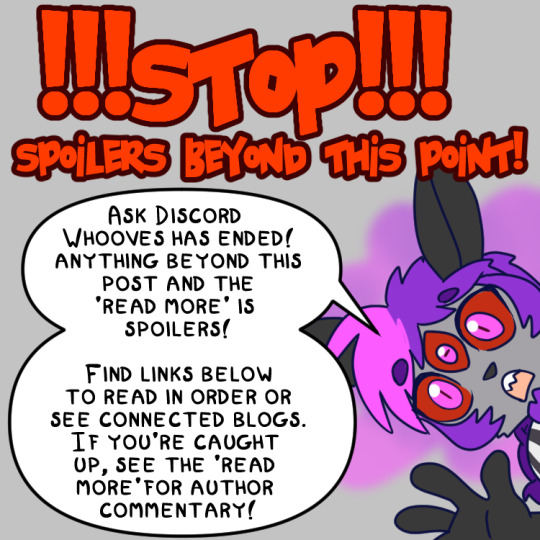
Ask Discord Whooves has come to its conclusion, and that means the posts below this point contain major spoilers for the story! This post will also have the author's final comments below a 'read more' to avoid spoilers. In this commentary, I will talk about new details about the story, such as what the future looks like in this universe and clearing up some lore.
If you wish to read from the beginning, you can start from the first page here!
Or, if you were in the middle of reading and wish to start where you left off, go to the table of contents here!
Also for consideration, you can read the prequel blog @lovestruck-derpy and the side blog @askthetimemaster to get more insight on the story. It is recommended you read Lovestruck Derpy first, then Ask The Time Master after you've read Discord Whooves.
Other side blogs involved in the story that can be read after everything else for a little more insight are as follows:
@tantamount-time-turner @torchwoodv @valtavia
Thank you for being interested in the story, I hope you enjoy your read!
!!AUTHOR FINAL COMMENTS BELOW!!
It would be appreciated if people who have read the blog to its end read this post and give their input on the overall story via comment or reblog, or sending the author @jitterbugjive a comment via ask or submission.
Surprise, everyone! Coach is The Doctor's next life!
This was the original plan from the very start of when I made Coach. Look, here's some proof, the plush I had commissioned of him has a cutie mark!

For those who don't know who (Pony) Coach is, you can read a bunch of asks sent to him here and get to know him, and for those who do know him you can re-read with context:
[Coach at The-Character-Lounge]
Now, I know I've moved on and made Coach a human and his own character for my current main project, My Magic Grandpa, but that was because I loved him as a character so much that I couldn't just end him after Discord Whooves.
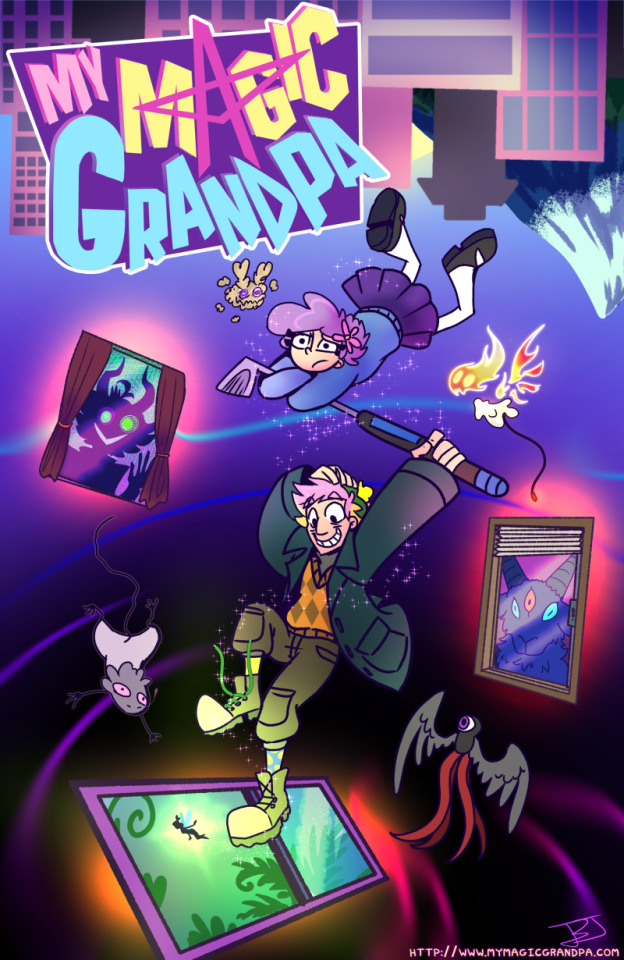
He and his Granddaughter Suzie have paranormal fantasy adventures in the 90s starting in Oregon. You can read the comic which has been updating for 4 years here: http://www.mymagicgrandpa.com OR http://www.mymagicgrandpa.net for better phone viewing.
If you want more Doctor Whooves content from me, consider following the youtube series "Doctor Whooves and Assistant", where I am the head writer and voice actor for Derpy. It is still active and hopefully will be for quite some time.
I also want people to know about three more of my original projects,”Bedeviled Dotty” ( @bedeviled-dotty), “Once Upon a Calamity” ( @nightmaretales) and “WTF? I’m a Magical Girl’s Familiar?!” (@magicalgirlsfamiliar) Two of which I want to start updating in 2024 and one that's been updating for a few years now.
OUAC has been around for a very long time, it’s a collection of familiar but twisted fairy tales and it has been on hiatus for years because of my other projects taking priority. I'm excited to be bringing it back.
WTF?MGF meanwhile is an adult dark comedy magical girl comic combined with an apocalyptic outbreak scenario. Its pilot will launch in January of 2024 and the comic will begin properly in 2025.
“Bedeviled Dotty” has been going for a few years now, and is a story about a magical anthro rabbit who makes a deal with a kitsune in order to obtain the love of her professor.
I highly encourage people to check them out!
Now about The Doctor version of Coach! When he first regenerated, he was ecstatic to have a small nose!
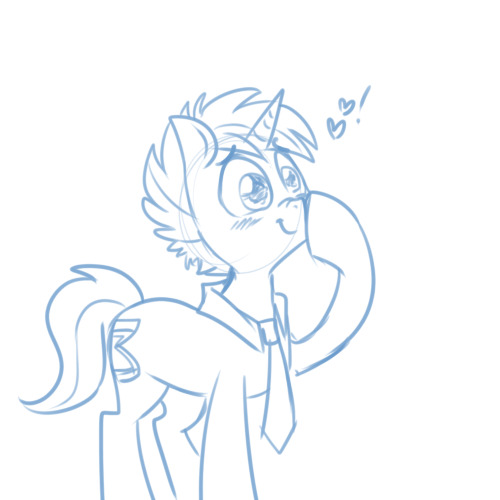
Not only that but he had a new appreciation for life and took on a life to the fullest attitude. He also cast away the identity of 'The Doctor', letting himself become his own as 'Coach' because he considers himself a referee to the universe and a sort of life coach to whoever he encounters. (Those that can stand him of course) He loves interacting with others, but he can be impatient and snippy at times and quite pushy without meaning to. He also has a hard time reading others' emotions, and can only think in context of how he would feel. This is because in this life he has something akin to ASD that he's unaware of, and it's a huge challenge for him because of how much he wants to help and entertain others.
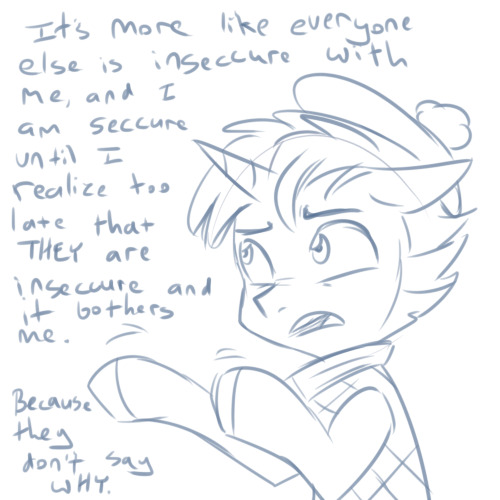
He likes to use sports words and phrases in his vocabulary, which would be his quirk. He also collects sports equipment and uses them for experiments and inventions, though he doesn't really like sports themselves.
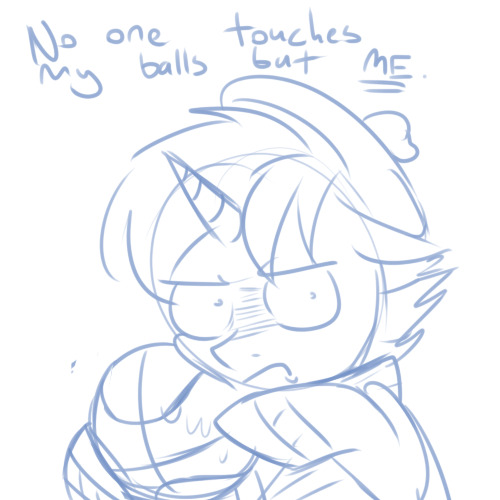
One of the last things Derpy said to him before she died was that she had no regrets, and neither should he. So in his next life, as Coach, he took this very seriously and is always moving forward with no regrets. This can make him seem heartless at times because of how easily he leaves things behind, but he always needs to be on the move and needs to change things up because he's teaming with chaos magic.

That's right, the chaos energy stayed with him, but it manifested in a more controllable form because he became a unicorn. He can't use normal unicorn spells, a lot of his magic has a mind of its own. It will often do as asked, but it will do it in random ways. 'Open a locked door' for example could mean unlocking the door, or turning the door into popcorn. One of his first magic mishaps was transmogrifying his sonic screwdriver into a golf club. It still functions the same, just has a different shape now.
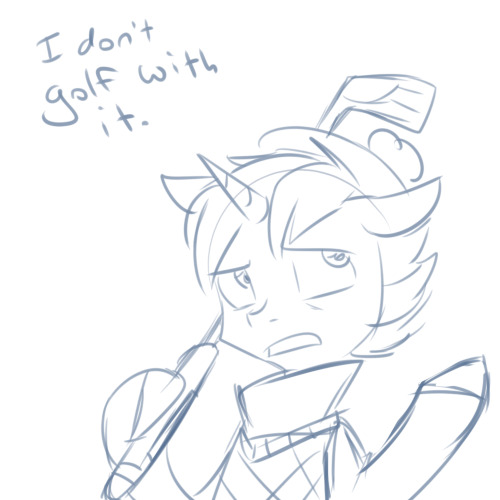
Coach spent about 60 years exploring on his own and taking on temporary companions that he'd keep a distance from so chances of anything bad happening to them would be less. But he eventually longs to see his Grandaughter, Tootsie Flute, and wants to take her on adventures with him, feeling like it would be a good do-over from the old Doctor's life. He fondly calls her Suzie because of reminiscing about the memories of Susan from the 1st Doctor days. While Suzie is often exasperated with him, she is also fascinated with him and the things he shows her. She has to keep their adventures a secret though, because Coach is scared to face his old family again and disappoint them. He doesn't want to see them without being able to understand them any more, it would break his hearts.

In order to take Suzie on adventures with him, they find a rogue changeling to replace her at home.

Speaking of changelings, he keeps in contact with [Tantamount Doctor], who has since started his own hive and is now a Royal. He gets much adored offerings of cheese from Coach.
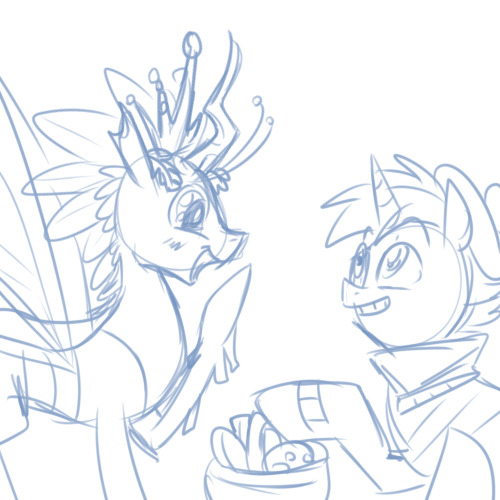
The Doctor also never really felt like there was a right time to approach The Master’s daughter, Eighth Note. He kept feeling like it would ruin her otherwise good life to introduce her to time and space like that. She grew up to be a nurse in a maternity ward, her beautiful voice soothing babies as she would sing to them. Perhaps she has a little hypnotic influence from her father?
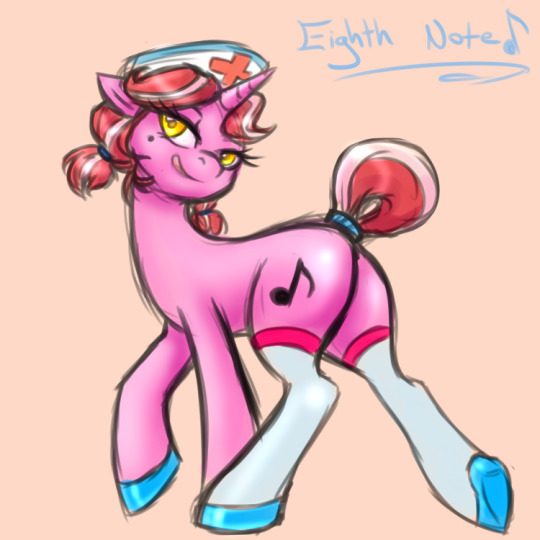
But Coach meanwhile with his no regrets attitude charged right in to take her on as a temporary companion to show her the ropes of being a Time Lord and having a TARDIS of her own. Needless to say, she’s trouble for Coach, as she can be a huge tease and she enjoys flustering the poor guy who just doesn’t want the Master to come back from the grave to kill him. It’s all in good fun for her and never serious, though, so nothing of an intimate nature really happens between them.
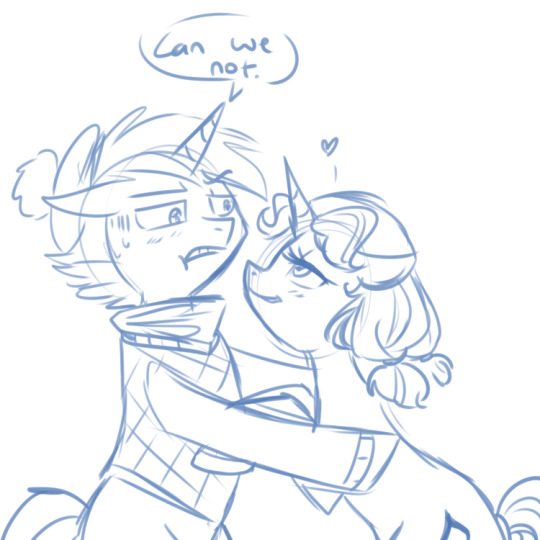
Finally, whenever Coach regenerated which wouldn't be for a long time, it would be because the chaos magic would become too unstable and the only way he can stay alive is to regenerate into a draconequus. Which gives us -drumroll-
Pandemonium!

Pandemonium is on the chaotic good alignment and he finds a way to bring back Gallopfrey and allow the true pony Doctor and Master to exist. He playfully antagonizes them and tries to keep them on a good path as best he can.
And that's pretty much how the whole thing ends!
When I started Discord Whooves, I was in a pretty dark place. I was bitter, angry, feeling like I had to fill peoples' expectations without really having anything special of my own. Discord Whooves started as a vent blog because A. The Brony fandom's constant pressure on me as a well known voice actor for Derpy, which made me bitter about her, B. Because I was upset I was getting known more for my voice than my main talent, drawing, on top of feeling dysphoric about my feminine voice, and C. The expectations that were on me reflected on how I acted, and I wanted to do something dark without my old name attached to it to prove I could do something interesting besides PG rated radio plays. I gained a lot more popularity than I thought I ever would, and had so much support, and as JitterbugJive I got to be myself without any expectations. It helped me come out eventually not only as BaldDumboRat, but as a transgender male.
Popularity sadly got to my head, it caused a lot of stress and a lot of outbursts and when I started my mod blog I was a very calm person who brushed things off. But more and more people started to pick fights with me and I felt the need to defend myself. This was also during a time I made another vent blog that was for dealing with the abuse I'd been through in the past, so I was facing a lot of demons at the time and could be triggered easily.
And then I had my bi-polar manic episode that made me literally insane for months, which threw me in to a year long depression that destroyed my art for a good while (It looked really really awful during that time, a lot of people noticed it) but the good thing about it was that it got me in touch with a therapist and got me diagnosed not only bi-polar 1 but PTSD, which was a shock to me but it made a lot of sense. I got a PTSD service dog, anxiety medication, bi-polar medication, and while the year of depression sucked I slowly got to pull myself back together and reflect on who I'd been. With anxiety meds I wasn't getting as angry any more, and therapy was helping me properly cope with the past and with the popularity issues. I wanted to be a better person, and I became one.
I even decided to take on a career path where I could help other people like me and like Discord Doctor, becoming a peer wellness specialist to help those experiencing mental illness and addiction. I use my own experiences to connect with them, give them hope, and show them they are not alone and there are people who do understand what they're going through who will help them. The training I went through ended up changing a lot of aspects of how Discord Whooves was treated moving forward, giving him a more realistic journey and showing people a very true message of hope and recovery. And the only reason I'm where I am now is because of experiencing that first psychotic episode that made me reach out for help.
I had two psychotic episodes in the span of Discord Whooves’ run, and they gave me a first hand experience of what it’s like to completely lose control of your own actions. I hurt people, I caused a lot of damage, and I had to face the consequences of those actions. And because of this, I had personal knowledge of what it’s like to come out of such a horrible state, and all the guilt and fear that comes with it. The Doctor’s journey suddenly became so much more personal to me, because I’d been there. And his journey of recovery is to show that despite everything, there’s still hope. Recovery is possible.
Something else my mania did was lead me to the idea of My Magic Grandpa, because my head came up with so many crazy ideas that I wanted to use and I was looking for a lot of inspiration during my depression that it all started coming together. And thus Coach and Suzie evolved into humans in their own story, because I didn't entirely want Discord Whooves to end where Coach and Suzie only just begins. And now they can continue on in their own way, in my own way, and I can let go of a blog about depression and anger and instead make a story about growth and inspiration.
In a way, it's like I regenerated with The Doctor, and I hope people can appreciate that and continue to support me.
I want to thank all the people who have worked with me on this project, be it for crossover, to contribute guest art, to Warden and Lauren and a handful of other people who helped me write the story and brought fantastic characters into it. I couldn’t have gotten this far without you, and the story would be in a much worse place now if it weren’t for everyone’s help.
Thank you all for staying with me on this 12 year journey. Looking back, I've made some dumb mistakes, but I learned a lot from them and your dedication helped me stick to my guns and end my first large scale project! It hit some bumps but dammit I made it happen and I am so happy I did! Now I hope people will check out my other projects that were linked above. I will still produce pony content on @the-character-lounge on occasion when I have the time and motivation.
I want to continue to bring everyone compelling stories that will tug at their emotions, and I don't plan on disappearing. So if you want to continue this journey with me, to see what Coach and Suzie have evolved into, please give my other works a follow!
Thank you, everyone! Your comments on this post in particular would be greatly appreciated! What did you think of the story as a whole? What do you think of Coach being the Doctor’s new life? Are there things you were expecting or wished would be different? How would you have ended the story? Did you enjoy the finale? Did you have a theory that Coach was The Doctor? Who was your favorite character? Favorite moment? Least favorite moment? I want to know! Please talk about it!
246 notes
·
View notes
Text
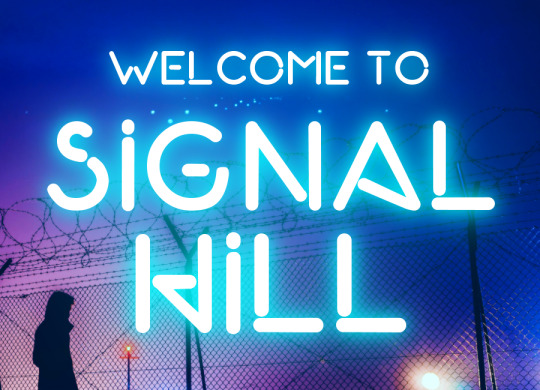
The world went to shit long before you were born- what happened, nobody's sure. Whatever it was, it left a mess. The horrors of the blasted wasteland, the things that roam outside of city walls, the static that buzzes in your ear like an old TV... not to mention the violent fuckers out there who'd rather they have what you've got.
But a job with a caravan travelling across the wastes means you can finally start a new life in the neon-lit utopia of Signal Hill. That is, until you're ambushed outside the city, your cargo stolen and your guards dead. The bright lights and the ever-present hum of the radio are starting to feel like more of a nightmare than a dream...

Signal Hill is a post-apocalyptic narrative RPG/interactive fiction game set in the eponymous neon-lit utopia, Signal Hill. Players take on the role of a wanderer from the North, arriving in the city for the first time and become enthralled in its local intrigue. It also contains gratuitous violence and sexual themes, so the current demo is recommended for adults only.

Over 83,000 words of quests, conversations, and locations
A detailed text-based open world to explore
5 fully-realized authored quests to pursue
Choose your weapon, skills, and customize your character
140 clothing options, and dozens of other customization options
Fully customizable pronouns & gender (separate)
8 available identities to define who you are through your choices
Meet most of the main cast
SEE FOR YOURSELF. TRY IT OUT.
#it's definitely not going to be what some of y'all expected but i hope that's in a good way ;)#soooooo proud of this weird little game#interactive fiction#if#demo release#indie games#signal hill#signal hill if
730 notes
·
View notes
Text
[EOA2] Years In The Future, But Not Many: Adolescence and Time in Act 2 of Homestuck
‘Stories of cultural evolution and of individual adolescent development prioritize the ending; they are primarily narratives of fulfillment.’ – Nancy Lesko (2001)
Act 2 of Homestuck takes place in a single afternoon, and also spans the whole history of life on earth, from before the Pacific Ocean formed to a post-apocalyptic wasteland. As time flashes and contorts and makes a maze of sequential storytelling, our main characters remain frozen at thirteen years old, locked in time at the end of the world. The modern teenager is culturally constructed as a person who is always waiting and preparing, running to keep up with milestones and punished for stepping outside a correct order. Teenagers’ only, and very difficult, job is to adequately prepare for adulthood – an adulthood that is always years in the future, but not many.
This essay looks at adolescence as it is theorized in society and in young adult literature, with a focus on its temporal dimension. It then applies these theories to Act 2 of Homestuck, asking to what extent Homestuck recreates, explores or subverts dominant ideas of adolescence with its characterizations and nonlinear storytelling. It’s about 8,000 words; to skip the theoretical background and just read the Homestuck analysis, Ctrl+F for ‘Paragraphs in the future…’ and read from that section onwards.
This essay is also hosted on ao3 and has a bibliography.



Background: Normal Teenagers, Normal Development
‘A child’s social, and ontological purpose is therefore, it would seem, not to stay a child… any signs of entrenchment or backtracking, like play for example, may be interpreted as indicators of a failure to ‘develop’’ – Chris Jenks (2009)
All current adults have experienced childhood and adolescence – it is ‘the only truly common experience of being human’ (Jenks). Adolescence was not theorized in academia until the late 1800s, but had a social meaning much earlier; in 1818, Isaac Taylor published Advice to the Teens, Or, Practical Help Towards the Formation of One’s Own Character at the tender age of fifty-nine. G Stanley Hall, the first scholar of adolescence, was also fifty-nine in 1904 when he characterized the teenage experience as ‘storm and stress’, a time of turbulence, mood and behavioral changes, and conflict with authority.
In this early era of research, children and adolescents were studied in terms of their deviations from the ‘normal adult’, who was explicitly characterized as a middle-class white man. Young people were seen as speedrunning all stages of human evolution before reaching this ‘enlightened’ state at the onset of adulthood; the entirety of history recreated in each individual life. Those seen as ‘further down’ the evolutionary ladder – people of color and the working class in addition to adolescents – were viewed as biologically determined, controlled by their hormones and ‘underdeveloped’ brains, making it the job of those more ‘advanced’ to restrict their behavior. In this way, minors became a marginalized group, and adolescence became a training ground. By positioning teenagers as not yet capable of rational thinking and decision making, it was easy to justify controlling them until they were ‘ready’ to be full members of society.
Modern social scientists generally believe that our idea of ‘the adolescent’ was constructed in the early 20th century, in response to specific social conditions – but many people, including parents, teachers, journalists and young adult fiction authors, retain ideas about the ‘inherent nature’ of teenagers. Science surrounding the ‘teenage brain’ is picked up by popular media and adopted as proof of a biological basis of behavior, and two studies found that preservice teachers saw their future teenage students as ‘incomplete people’. Teenagers have long been described as overly emotional, as unstable due to raging hormones, as disrespectful and rebellious towards authority, delinquents and criminals, lacking individuality, lazy and disengaged, loud and disruptive, politically inactive, hedonistic, immature, as wasting their youth and health, and as not to be taken seriously. In the 21st century, the discourse shifts slightly: teenagers are just as much of a problem, but now they are entitled, inattentive, lacking in intelligence, work ethic and critical thinking skills, reliant on technology, spending too much time indoors, self- and celebrity-obsessed, irresponsible with money, overly sensitive and nihilistic towards the future. When these beliefs are dispersed throughout society and reiterated from all angles, it is no surprise that young people internalize them, and fulfill the prophecy they are told is unavoidable.
Politically, the ‘correct’ development of young people is crucial. The youth are the future adults, and as future adults, it is crucial that they advance society in the ‘right’ direction, and continue along the same path as the current adults. Hand in hand with the idea of teenagers’ inherent nature is the idea that their future trajectory can be changed through the right guidance and the right policy. Placed in a political spotlight, young people are always the ones to be concerned about, never able to formally raise their own concerns. Teenagers are denied the right to vote in countries they will likely be citizens of for their whole lives, and if they attempt to enter political arenas, are widely disparaged with their ideas seen as unrealistic and overly radical. They should instead be waiting their turn, with the expectation that their views will become more moderate by the time they are ‘mature’ enough to guide society.
In her re-theorization of adolescence Act Your Age! A Cultural Construction of Adolescence, Nancy Lesko points out that adolescence is defined through chronological age, and therefore through time. Pointing to theories of the clock as the technology that best defines the modern age, she discusses how youth are kept to a schedule of universalized milestones. One example is age graded schools, where all students are expected to turn thirteen during the seventh grade, and to all achieve the same defined educational standard at this age. Activities such as learning to drive and entering paid work are legally prohibited until a certain age, but people are expected to do these shortly after reaching these milestones, or they will be seen as falling behind. Physical markers of puberty are expected in narrow age ranges, and teenagers are medically pathologized if their bodies mature too fast or too slow. Social development, such as the expectation that adolescents will have their first kisses and first romantic relationships in their early teens, also qualify as milestones. Placed in narrowly age-grouped environments, young people will continually compare themselves to their peers, and those who reach milestones on time are socially rewarded by each other as well as by adults.
These milestones are not end points in themselves, but simply necessary steps along a path of becoming, always focused on the adult a teenager will be. Adults are positioned as superior in society, and to develop as a child is to become more adultlike. When a young person is given increased freedom and responsibility, it is bestowed by adults with the expectation that they will make the decisions of the adult – a teenager told they no longer have a curfew is probably still expected to come home at an adult-defined ‘reasonable time’, otherwise, the curfew will likely be reinstated.
The significance of adolescent decisions and experiences are often minimized. A first heartbreak, a failure to qualify for a sports team, or a decision between two potential friend groups or two academic tracks has a major impact on a teenager’s day to day life, but adults are typically dismissive, framing the issues from their perspective – when the teen is older, they will surely realize the insignificance of this training-ground decision to the arena of real life. Future reflections are privileged over in the moment feelings.
Time, more broadly, has been theorized by philosophers in many different ways, and studies have shown that humans intuitively understand time as both linear (happening one moment after another, continuous and unstoppable) and spatial (held in memory, with moments from the past able to be recaptured and moments from the future rehearsed). Western society heavily privileges the linear view, where time is measurable, unidirectional, and correlated with progress. Once a milestone has been reached, regression is unacceptable. A teenager putting away their Lego sets to get a part time job would be criticized for quitting that job and returning to their toys, and a high school that sees a year-on-year decline in standardized test results is seen as ‘failing’, regardless of other metrics (such as students’ mental health). Individuals and societies must continue to grow and advance with time; a logic which guides our current economic system as well as previous colonial projects. The fear of a society in decline is arguably the primary driving force behind the general obsession with youth, and with the ways the current adolescent generation is inferior to the previous.
This runs contrary to real experiences of time, which involve expansion, compression, twists, circles, loss, gain, running out and having too much. Time passes faster for a fifty year old compared to a fifteen year old. It passes faster when spending time with friends than when waiting for a bus in the rain, faster when anxiously preparing for a final exam than when waiting for results with fingers crossed. Adolescence, in its entirety, passes faster for a teenager raised in poverty who helps provide income and childcare at the age of fourteen than for an upper middle class teenager given a sizable income until they leave college at twenty-two. The past is returned to, over and over again, by adults who relive their high school yearbooks, watch television shows set in high schools, and reconceptualize their own adolescence by watching their children. My personal experience of time changed radically when I took on a seven year project, and started planning for a long term future as well as a short. Time is important not only in how it is spent, but in how it is captured, preserved, and shared.
Technological developments have further changed the experience of time for people of all ages. Writing in 2008, Judy Wajcman discusses the common belief that the pace of life is speeding up, as studies have found that across the second half of the twentieth century, people subjectively experienced feeling more rushed with decreased time for leisure. Some possible explanations discussed are how mobile communication has led to people organizing their lives around blocks of time instead of physical locations, as more activities are available ‘on the go’. There are greater expectations for people to do multiple tasks simultaneously, and mobile devices allow for people to plan and coordinate their time, and therefore optimize it for maximum productivity. Communication and the search for information happen at beyond-human speeds, and time that would historically have been ‘waiting time’ becomes obsolete.
For teenagers especially, social media has changed the experience of time, with young people feeling increased pressure to post frequently, respond to messages in the moment, and record their lives. One teenager explained social media as ‘kind of like documenting your life – you can look back in ten years time, you'll have all these pictures and comments’ while another, discussing taking photographs at Madame Tussauds, suggested that ‘the images became significant after the visit when they could be used to “tell stories” to others, providing digital prompts and enabling conversation about culture’ (Manchester & Pett, 2015). As affordable cultural spaces for teenagers decline, with fewer discos, malls and parks as well as a cultural shift away from parents allowing their children to roam outside, teenagers’ use of time also changes, and young people – especially the working class – report finding themselves with nothing to do.
In contrast, some middle-class young people have the opposite problem, their lives a far cry from the ‘leisure class’ of their peers fifty years before. Some schools begin careers education in middle school, and high achieving youth with college prospects are encouraged to fill their time with extracurriculars, volunteer work and academic preparation, held up against their peers who are using their time more effectively now, and are sure to see better futures because of it. In this way, some teenagers find themselves quite literally waiting for the time to pass and the next stage of life to arrive, while others find themselves working against the clock, trying to complete all preparatory work in time for their entry into adulthood. Despite attempts at standardization, real experiences of both adolescence and time are highly variable, responsive to individual differences, social positions, and new technologies.
Background: Narratives About Youth
‘Behind every disempowered teen narrator is an empowered adult author conveying ideology about the superiority of adult norms.’ – Petrone et al. (2015)
As teenagers became a distinct marketing group, new culture industries grew up around them. The first teen movies, focused on delinquent teenage boys committing crimes due to lack of adequate parenting, were released in the 1950s. In his book The Road to Romance and Ruin: Teen Films and Youth Culture, Jon Lewis argues that via these movies, adults projected their own discontent with modern society onto the teenage characters they created. He views all narrative as ideological, as even the most rebellious and anti-establishment teen movies end up reinforcing adult authority, with characters coming to regret their deviance and ‘reform’ themselves, or being punished for their actions.
Young adult literature was slower to develop, but grew in popularity throughout the 1970s and 80s. So named because it focuses on similar themes to adult books but intended for a younger audience, young adult books can work in any genre, but focus on teenage protagonists and coming of age narratives. Whether real or fantastical, these protagonists navigate the rules and power structures of the world around them, go through some type of trial and eventually learn a lesson crucial to adulthood. It has been argued that the classical narrative is inherently adolescent, as stories by their nature deal with development and change; postmodern fiction does not always follow these rules but it is true for many works for all age groups.
Jon Lewis also discusses the ‘notion of cause and effect’ as it applies to teenagers being ‘at once a mass movement and a mass market’. Many people have argued that the ‘teenager’ was partly created by marketing industries, who, noticing young people’s increased free time and money in the 1950s, created products to fill that niche. Other scholars assert the agency of young people in creating their own subcultures, saying that teen culture arises spontaneously, with adolescents just as likely to adopt a symbol not specifically marketed to them – such as the safety pin’s role in punk culture – as to be swayed by intentional marketing.
In media, the product being sold is an identity to embody. The protagonist of a teen movie can be both relatable and aspirational – they reflect both who the viewer is, and who they want to be. A teenage protagonist is described as ‘relatable’ and ‘authentic’ if they appear to reflect experiences of actual teenagers, who are conceptualized here as a monolith. Petrone et al. point out that such an analysis would seem ridiculous if a character were described as an ‘authentic adult’. They advocate for a more nuanced discussion of ideas surrounding adolescence in fiction – a Youth Lens, which questions how literature represents adolescence, what assumptions the story makes about youth and how that frames plots and characterizations, and to what extent the text reinforces or subverts the dominant understandings. They believe this could pave the way for more varied representations of teenagers, which could positively impact young readers, as ‘writers who foreground examples of youth who do not follow conventional expectations of adolescence can shift how youth might be understood’.
Young adult literature is typically written by adult authors, capturing a reflection of teen culture instead of the reality. It is also regulated by adults – editors and publishers who decide whether a book can be marketed for young adults, and librarians and bookstore owners who decide whether to categorize it as such. Mature themes – including mental health, death, drug abuse, sex, and structural issues such as racism – do feature in young adult fiction, but there are no formal guidelines, and any book seen as ‘going too far’ is liable to be kept away from teenagers.
Writing about young adult fantastical fiction, Alison Waller shows how fantasy narratives reinforce adult norms just as much as realistic fiction; the expectations of growth on a young witch, werewolf or ‘chosen one’ are not radically different from those on real life teenagers. A common theme in dystopian and high fantasy fiction sees a teenage protagonist framed as the only hope for the future, a person prophesized to both change and save their world. Although this narrative may seem progressive as it allows for radical change, in reality these characters are generally guided by wiser adult characters who influence their decisions, and the story is not so different from the real life expectation that the next generation will save us from the problems caused by the previous.
In time travel narratives specifically, a protagonist may go back in time to a situation where they have improved agency and a subjectively better life, but by the end of the story, will voluntarily decide that returning to the present is the right thing to do. A temporary move backwards gives this character the tools they need to succeed at the next stage of life, and overall, their chronological and developmental trajectory is not disrupted. Where a secondary character chooses the past over the future, the narrative tends to treat them with anxiety, positioning them as cautionary tales or as mistakes in need of fixing.
Novels, movies and video games are typically released as completed works – the creators know how the story ends before the work is released. This may not apply to books in a series, and also does not apply to many television shows, comic books, or audio dramas. In a format such as the sitcom, the growing up narrative is complicated – a teenage character may learn a lesson about sensitivity to others’ emotions in one episode, and return to their previous self-centered ways in the next, thereby allowing ‘adolescent’ to be a primary descriptor of the character, not a state to be grown out of. Creators who are teenagers themselves, such as published British author Rachael Wing and many online writers producing fanfiction and original fiction about characters their age, also present a new paradigm. Although they may be influenced by the judgments of adults, they are still writing based on their present experiences instead of memories and observations.
The internet expands possibilities for both narratives and creators. A work posted serially online has the chance to respond in real time to a young audience, and there are far fewer restrictions on what can be posted on the internet, meaning that stories can be made accessible to young adults even if a major publisher or a parent would disapprove. As the internet itself is an ‘adolescent’ rather than a ‘mature’ medium, exploring the possibilities of the medium itself could go hand in hand with disrupting a typical coming of age narrative.
Paragraphs in the future…
‘Try not to be so linear, dear.’ (p.421)
Homestuck is written by Andrew Hussie, a former teenager who turned 30 while writing Act 2 in 2009. Its principal characters are teenagers and like most stories, it is written from memories of being a teenager and observations of what teenagers are like today. Its first act is entirely linear, but Act 2 begins to explore time, continuity, and cause and effect. Readers can no longer assume that a page takes place after its preceding page, and the main characters – John, Rose, Dave and the Wayward Vagabond – all exist at different points along the timeline.
I believe that Act 2 represents time as it is actually experienced by teenagers, where growth and personal development are not always linear and not always in sync with that of others. John, Rose and Dave are all growing up in the 2000s USA, and are all subject to roughly the same cultural expectations as described in the earlier sections, just as the overall work is written in that context. Looking at each character in turn, I will discuss to what extent they conform to dominant conceptions of ‘the teenager’ and how they experience time within the narrative, with a view to asking whether Homestuck could offer a new understanding of adolescence.
John Egbert
‘And even meanerwhile, in the present. Sort of. Once again, the slippery antagonist eludes you.’ (p.385)
As the principal character and the first introduced, John’s time is arbitrarily defined as ‘the present’ – pages 334 and 385 both say as such. However, at the end of act 1, John is transported to a ‘realm untouched by the flow of time’ (p.421) and while time continues to pass for him, it’s not necessarily in step with Earth time, indicated by the ??:?? timestamps on his Pesterlogs. As such, John’s ‘normal’ development has been stalled on the day he becomes a teenager, and he’s locked off from the future of his society.
For John, time and space are linked. Although he has been removed from time and therefore from normal expectations, he’s still stuck in his house, the one piece of his culture that he brought with him. The picture John’s dad pinned to the fridge and the green slime pogo ride John continues to define himself by in this act both keep him tied to his childhood. While he’s here, John can’t escape a multitude of authority figures. His dad has been kidnapped, but still leaves notes around the house congratulating John on his maturity – ‘You are strong enough to lift the safe. You are now a man… I know you will take this responsibility seriously’ (p.546).
With Dad gone, Nannasprite steps in, having not seen John since he was very young. She restores John’s bedroom door to its hinges and restores the family order in the house, giving advice, controlling what John knows, and baking unprecedented amounts of cookies. Nannasprite calls John a ‘good boy’ (p.428), and the Wayward Vagabond’s first command to John is ‘BOY.’ (p.252), a word with assumptions about both John’s gender and current stage of life. Rose and WV also have guardianlike roles over John, able to control how he spends his time.
John is younger than Rose and Dave by a few months, but retains far more childlike qualities. His priorities lean towards play and silliness, as shown when he captchalogues shaving cream in case he suddenly needs to make a Santa beard (p.488) or makes a tent out of cruxite dowels (p.615), and he isn’t in any hurry to reach the signifiers of adulthood, such as shaving (p.544) or taking personal responsibility (p.643). The trait John most shares with the stereotypical teenager is poor emotional regulation – both his excitement and his frustration are obvious on his face and regularly interfere with his behavior (for example, p.429, p.637).
He passes the time instead of using the time, and is easily swayed by his peers. He has a drive for autonomy and self preservation, and will attempt to stand up for himself, but usually ends up deferring to the authority of his friends or guardians. He’s not very self-motivated except when it comes to putting bunnies back in boxes, and he enjoys consuming media, not all of which is age-appropriate – three of the movies on his wall are R-rated, including Con Air. He also plays popular video games and buys media merchandise such as T-shirts and posters, so falls into a mainstream youth marketing demographic.
As a prophesized savior positioned to undertake a hero’s journey, John is a classic young adult protagonist. He demonstrates the idea that the youth are our only hope, though they still require guidance from previous generations and are defined by their opposition to adulthood (seen through Nannasprite’s presence). However, despite Skaia influencing Earth since before life itself existed (p.757), it wasn’t until its power was harnessed into a video game that it began to threaten the world – youth’s popular culture is the thing that sends us all into decline, even if that culture was created and marketed by adults.
The earth already being ‘done for’ (p.427) allows for a subversion of the typical progress narrative. Page 757 indicates that Sburb may be influenced by ancient technology from outside of Earth, The end goal is not known, making John’s narrative defined by the journey and not by the ending, highlighting adolescence as a meaningful experience in and of itself, not only because of where it leads. And Sburb is already poking fun at John’s culture – the echeladder (p.405) parodies the milestone progression of youth, filled with meaningless and generic titles placed in an arbitrary order.
John’s destiny to ascend through the Seven Gates to Skaia, fighting with the light kingdom and attempting to overcome the dark forces’ destined win, could be read as an ascension from childhood to adulthood. John would be moving away from the sinful childlike state where young people are ruled by their base instincts of hunger, sleep, hormones and emotions, towards a rational and enlightened adulthood. But an inversion of this metaphor would work, too. John could move away from his culture’s ideal adult that he’s been told he’ll become – a person who is cynical, conformist, an obedient worker, driven by money and personal success – back towards the childlike state, retaining the open-mindedness, sense of whimsy and possibility, and creativity of childhood. Earth is done for, and so there’s no reason John should still be tied to the linear march of the culture he came from. He is perfectly positioned to imagine a new paradigm of adolescence, if he can break away from the ties – his house and his guardians – that try to tie him down to the ‘old ways’.
Rose Lalonde
‘To hear his mammoth belly gurgle is to know the Epoch of Joy has come to an abrupt end.’ (p.302)
In the narrative, Rose’s time is defined as the near future. Although her story directly overlaps with John’s, putting them at the same point in time, Rose is three timezones ahead and refers to other timezones as ‘younger’ (p.174). It’s night time for her, which visually distinguishes her panels and gives her story a more adult atmosphere. She is future oriented and proactive, planning for the next thing, and typically portrayed as one step ahead of John.
Rose has experienced the passage of time quickly, and has not had the luxury of lingering in childhood as John has. With a mother who is inattentive towards raising her and communicates through daily arguments (p.389) and ‘notes’ on the fridge (p.366), Rose likely had to develop independence and adult traits at a young age. She would be considered ‘precocious’, a word typically carrying a negative or judgmental tone describing a young person whose achievements or inclinations are happening ‘too soon’. In the narrative, Rose is continually running out of time, watching the battery on her laptop slowly drain and the forest fire surrounding her house creep closer. This anxiety of something yet to come positions Rose as a teenager who is awaiting the future and making use of every possible moment to prepare for it.
Educationally, she has a larger vocabulary than the average person her age, and likely a higher reading level. Practically, she understands construction and generator safety, has a good grasp of modern technology such as computers as well as classic skills such as knitting, and the hand eye coordination to do these things well. She demonstrates abstract and critical thinking, and attempts – with varying levels of success – to understand the consequences of her actions. She shows an understanding of a world greater than herself when she wishes Jaspers had been allowed to decompose (p.414) and avoids allocating her grimoire to her strife specibus (p.297). Despite being raised by a rich mother, she enjoys a challenge and is willing to work hard, rejecting childlike wish-fulfillment fantasies such as princesses and wizards.
Rose is a teenager who attempts to fill her time with activities she sees as productive and as bettering her as a person. She has internalized adult values and would prefer to get there too soon than be left behind, and she works hard to define herself through timeless, sophisticated hobbies such as literature, knitting and the violin, generally resisting mass culture that would be typically marketed to teens; unlike John she disrupts the idea of the teenager as mindless consumer or as defined by her peers’ interests. She tries to avoid juvenile behavior and scorns it in others (p.249) and is very attuned to cultural expectations, feeling a nebulous pair of eyes upon her judging the appropriateness of her actions, which affects her decisions (p.370), almost as if she is trying to skip the complicated, messy parts of being a modern teenager and move directly from childhood into rational adulthood.
It’s rare for Rose to regress into childlike behavior, such as the ‘W’ mustache (p.370) and the Youth Roll (p.379), and she usually ends up regretting or correcting the behavior afterwards (p.398, p.380). Her disdain for her mother suggests that she is self-correcting and trying to parent herself in response to these ‘slips’. Notably on page 440, Rose works on her GameFAQs, which are intended as an informative guide to future players. Accidentally slipping into a frustrated and self-berating personal anecdote, she strikes out the passage and again criticizes her own regression, which is immediately followed by a narrative shift into Rose’s actual past.
Rose struggles with patience, and with waiting for other people to catch up to her. She understands the seriousness of her situation; for her adolescence is a time of survival, her decisions now liable to affect her entire future. Act 2’s title, ‘Raise of the Conductor’s Baton’, appears in the text in relation to Rose - ‘Somewhere a zealous god threads these strings between the clouds and the earth, preparing for a symphony it fears impossible to play. And so it threads on, and on, delaying the raise of the conductor's baton’ (p.307). This certainly links to Rose’s experience of time, her living in expectant mode for a terrifying, looming future.
Primarily Rose strives for the ‘positive’ markers of adulthood, such as responsibility and educational attainment, but she also tries to be casual regarding sex, such as claiming to enjoy Dave’s bro’s websites (p.419). The only markers of adulthood she openly rejects are alcohol and domestic chores, both of which the text associates with Rose’s mother, who Rose views as a cautionary tale and the ‘wrong’ kind of adult. Through Rose’s relationship with her mother, there is space to question the idea put forward by other media that teenagers become dangers to society through poor parental oversight; Rose is certainly a rebellious and anti-authority teen, but her ‘rebellion’ consists of asserting her own capability and responsibility, such as turning down alcohol in favor of water (p.388).
Rose sees herself as the more responsible of the two of them, but it remains uncertain whether the narrative will legitimize this. By being positioned in a guardianlike role over John she disrupts the typical adult-youth dynamic, and is given a chance to prove her chesslike skills of thinking several steps ahead while staying responsive to new information, evidenced by her GameFAQ updates. However, in the final page of the act, Rose’s ability to manage her own life reaches its limits, and it is her mother who saves her by opening a secret passage, having apparently planned for this all along. Here Rose’s independence is taken from her and she is once again the teenager who needs a firm guiding hand, despite apparently working much harder than her mother. This reinforces a typical authority structure and is dismissive of Rose’s legitimate problems with her mother, as despite her flaws she is still a necessary figure in Rose’s life.
In future acts, Rose’s character arc could go multiple ways, particularly once she enters the Medium and is presumably separated from her mother. The story could legitimize her drive to grow up at a young age and allow her to take on a leadership role that she does seem well positioned for, given her ability to keep a clear head and solve problems in real time. In this narrative, Rose would not be punished or put back in her ‘rightful place’ for speeding through time, instead, her early development would allow her to be valuable to the group, and to challenge herself in ways a thirteen-year-old would not have access to in the real world. Alternatively, Rose could have an arc that allows her to go ‘back in time’ and reclaim her more youthful traits, taking on some of John’s silliness, handing over responsibility or making bad and uninformed decisions when in a new context, for example when she becomes a client player. This could also be subversive if returning from a more adultlike to a more childlike state is portrayed as a valid and meaningful journey in its own right, instead of as someone who grew up too fast returning to their ‘correct’ place in time.
Dave Strider
‘You just don’t have time for this bullshit. You’ll catch up later.’ (p.332)
Dave’s narrative time is defined as the past. His story begins on page 308, at the same moment where John’s story began on page 1. John and Rose are several hours ahead of him by now, and Dave’s storyline is constantly racing to catch up. Like any teen looking around and watching their peers maturing physically and socially while they fail to keep up, Dave is always missing information and excluded from his friends’ activities. The narrator makes sly references to Dave being in the past and unaware of what’s to come (p.314) like a nagging thought in the back of his head, and in every page, he has the relic of a five-year-old movie stamped on his face.
In reality, Dave is not failing to meet developmental milestones – quite the opposite. In a world where the athletic achievement of young men is prized and adults are expected to be in control of their own bodies, Dave is physically fit with quick reflexes, able to fight, jump, dodge and perform an ‘acrobatic fucking pirouette’ (p.579, p.665), even without regular access to food. The original, early 20th century Boy Scouts prepared boys for military service primarily through obedience, a sense of duty, and personal responsibility towards physical development; Dave’s brother with his strict sword-training and Saw trap regime is instilling similar values.
Dave does participate in mainstream culture, evidenced by his regular reading of GameBro and his desire to be ‘cool’ and to like the same things as his brother – but he’s not only a consumer of culture, he’s also a producer. He writes a blog, ostensibly on a regular schedule, and produces a webcomic, combining creative and analytical pursuits. He regularly refers to himself as ‘busy’ (p.309, etc) and says he ‘doesn’t have time’ for things (p.310, 332), has ‘a lot on [his] plate’ (p.333), and that it’s ‘hard to get any work done’ (p.381). Dave sees his internet projects as work, as commitments he needs to make time for, and he’s not afraid to push back against the player’s commands if he thinks they wouldn’t be a good use of his time.
He has the Complete Bullshit desktop application and keeps up with his brother’s projects, and likely other internet culture too, to stay on the cutting edge of irony that he prides himself on. It seems like Dave’s time is largely full and he struggles to fit everything in. He is very aware of the constantly changing, modern society that he lives in and wants to stay on the pulse of these changes. Less than six months after Obama’s election, a black president is no longer noteworthy to Dave (p.287), and he creates remixes with electronic samplers instead of playing classical instruments like his friends. He’s always online and always keeping in real time contact with his friends; he ‘pesters [Rose] like clockwork’ (p.415). Trying to keep the beat of an ever-shifting internet meme culture to stay cool and avoid being outdated at all costs is exhausting, and it’s no wonder Dave sometimes struggles to keep up.
Living in the city, a place where the pace of life is quickest, in a time of rapid technological and cultural change already creates a ‘racing against the clock’ mindset, and Dave’s relationship with his brother compounds this. By modeling himself on Jigsaw, a villain who created complex, physically violent traps with strict time limits, he forces Dave to be constantly on guard, constantly expecting the next danger, yet often a moment too late for it, behaving like an intense ‘no pain, no gain’ style sports coach. On the surface, Dave’s sunglasses, frown and monosyllables look like a rebellious teen movie protagonist, but beneath that, Dave best corresponds to a real life high achieving teenager who is put under pressure to achieve even more by the adults around them.
Dave’s story so far has focused on the ‘campaign of one-upmanship’ between himself and his brother as he fights for his brother’s Sburb game discs – his brother is an obstacle to both his plot development and his emotional development (for example, admitting that he’s uncomfortable with his brother’s hobbies). This is likely setting up a ‘loss of innocence’ story, where Dave has to come to terms with harsh realities of the adult world by recognizing that an authority figure is imperfect. This is a fairly typical growing up narrative that does not disrupt conventional ideas of linear growth, as the adult world is widely seen as darker, more serious, and something young people need to be protected from.
However, I think Dave’s status as a subcultural producer places him outside a typical youth/adult binary. Dave is not overall presented as adultlike, as he follows trends and is fully subservient to the adult in his life, and his hobbies – Sweet Bro and Hella Jeff, sweet bro’s hella blog, and remixing music – don’t place him on a typical path to adulthood. By establishing that Dave sees these as responsibilities, and as things he creates for a real audience of at minimum four people and potentially many more, Dave’s teenage experiences and creations are given importance without needing to be legitimated by adults (such as the narrator or his brother).
Dave’s self-motivation when it comes to his creative pursuits also disrupts ideas of teenagers as lazy or needing to be shaped by outside forces; he’s capable of sticking to a self-imposed schedule. However, his creative drive is part of a real-time responsiveness to internet culture – if he is taken to the Medium, outside the normal progression of time, would he be able to maintain this? An arc that focuses on Dave as a creator instead of Dave as a soldier could do more to complicate a typical youth narrative.
Wayward Vagabond
‘The APPEARIFIER cannot appearify something if it will create a TIME PARADOX’. (p.752)
The Wayward Vagabond is not a human adolescent, and does not come from the same culture as John, Rose and Dave – they discover the concepts of ‘cutlery’ and ‘politeness’ in Act 2, so are a long way from internalizing age-based ideals. As such, although WV exists in the future – their story taking place 413 years after the human characters’ – they are not more advanced, or more adult, than the others.
Alone in a wasteland and free from social influences, WV does not regulate their eating, is described as physically weak, expresses black and white opinions on governance, and loses track of time playing pretend games. At the same time, they show a good understanding of art, chess strategy and precise movements and distances. They pick up social and technological skills quickly and are very attuned to positions in space (p.743), but far less attuned to positions in time (p.755). Many of their actions are similarly nonsensical to John’s, and these moments of whimsy frame WV as childlike.
However, WV has a privileged position in time. Not only are they in the future, but they have the technology to experiment with temporal mechanics. Through a set of screens they are able to look back at and directly influence events from the past; they have authority over at least one young person, and can appearify objects from other points in time.
Being an adult and a child at the same time feels like a time paradox to us, just as appearifying a rotten pumpkin they ate earlier is a time paradox to WV. Having authority over a young person who, if he continued to grow in linear time, would be long dead by the time WV enters the bunker is also a paradox of normal development. By mixing childlike and adultlike traits, WV draws attention to the way roles in society are socially mediated and may not exist outside of their cultural moment. By living in a post-apocalyptic wasteland where advanced technology is lost to the ravages of nature, WV represents a type of person who could live in the future if the world does not follow a path of strict linear progress, but simply of change.
The appearifier and command station in WV’s bunker fundamentally change the function of time in the narrative. Although WV’s mastery of time is limited by the need to avoid paradoxes, if characters take actions to influence or improve the past, they disrupt the norm of future orientation and give equal importance to the past. Indeed, the pages titled ‘Years in the future…’ are not presented as the desirable end goal of the narrative, nor are they a terrible fate to be avoided. They are interesting asides to the story, but they are asides, with the bulk of them taking place in pages hosted outside of the main story. The story structure lets the past and present be centered in themselves, not just through their leading to the future.
The Narrator
‘Maybe you could go bug someone somewhere else for a while? Or at the very least, somewhen else.’ (p.440)
The position of any given Homestuck page within the timeline is uncertain until established by the narrator, who regularly exercises their power to shift back and forth, and to conceal these movements until the player has made a fool of themself. In this way, the narrator is positioned as an adult with perfect knowledge of the timeline, viewing adolescence in its totality. They have transcended the limitations of adolescence and have moved onto a real and meaningful time of life, and will occasionally reference their superior knowledge of future events with winks to the audience while keeping characters out of the loop – ‘you can’t imagine how a video game could save someone’s life’ (p.314) or ‘only… babies who poop in their diapers believe in [monsters]’ (p.387).
However, moments of the narrator criticizing or speaking condescendingly to the teenage characters is surprisingly rare. It happens occasionally, like with ‘This is COMPLETE BULLSHIT.’ (p.458) or ‘The circle of stupidity is complete’ (p.490) but the vast majority of narrative criticism is directed towards the Wayward Vagabond, the only character the narrator regularly speaks directly to. The narrator calls WV stupid on multiple occasions (for example, p.437, p.746), and tells them to defer to Rose’s decision making (p.277), but the majority of narrative text criticizing the kids’ behavior is actually just reporting their own thoughts, either towards themselves – ‘It seems the woman has you at a clear disadvantage’ (p.373) – or towards each other, such as ‘What the hell is that nincompoop doing?’ (p.508). When a command would lead to a bad decision, it’s generally the character who refutes it, not the narrator (p.489). In this way, although the narrator does have superior knowledge, they give center stage to adolescent perspectives.
Implicitly, the narrator controls the flow of time in the story – deciding who to switch to and in what moment of their story, allowing characters to speak or moving focus away from them – and the narrator is willing to indulge the characters in their non-plot critical diversions, rarely hurrying them along when they take extended time to read books or rearrange their sylladex, but allowing the minutiae of their experiences to matter. The narrator lists characters’ interests without judgment – adult characters are interested in clowns, wizards, puppets and sugary foods, while adolescent characters are interested in computer programming, knitting and specimen preservation, with no clear line on ‘acceptable’ interests for a given age group.
Zooming out a layer, Act 2 posits the idea of John, Rose and Dave’s stories available for viewing through a screen, four hundred and thirteen years in the future. As well as reflecting the existence of the webcomic itself, this contrasts the idea of adolescence as a transient state. The 13-year-old versions of these characters are frozen in time on the Wayward Vagabond’s screen. Born in the mid-1990s, these characters are among the first to grow up with social media, and with an internet moving away from anonymity. Their lives being recorded on the command terminal, in Rose’s GameFAQ screenshots (p.510) and in Bro’s Jigsaw puppet (p.570) are not a million miles from the teenagers documenting each other’s lives on Facebook in 2009 – and at the time of Act 2’s writing, it’s not yet certain what the real world impacts of this will be on current young people’s experiences of time.
Conclusion
‘Temporal movement into the future is understood as linear, uni-directional, and able to be separated from the present and the past… a conception of growth and change as recursive, as occurring over and over again as we move into new situations, would reorient us.’ - Nancy Lesko (2001)
Written in 2009, Homestuck carries the baggage of over a hundred years of public discourse around the teenager. Adulthood is seen as the most important stage of life, with teenagers as flawed, incomplete versions who need to be corrected before reaching the end goal of conventional adult society through conforming to a series of linear milestones. The expected development of real teenagers is reflected in the stories told about them, which focus on characters ‘coming of age’ and successfully internalizing adult norms.
By introducing nonlinear storytelling in Act 2, Homestuck represents time as teenagers actually experience it, which gives the comic a chance to explore and question dominant ideas of adolescence and adolescent time. John and Rose have relationships with guardian figures, including the narrator, that reinforce adult superiority, and all three kids have communication breakdowns between themselves and their guardians – but the skills and interests of teenagers are also given importance, and adults are not exempt from narrative criticism. The narrator is happy to indulge the teenagers just as often as to correct them.
The end of Act 2 positions Sburb as an organic entity of sorts, not necessarily created by adults in universe. Sburb encourages linear gameplay with progression up the Echeladder and through the Seven Gates, but the Medium’s position outside of time, and the fact that restoring the Earth is not the game’s goal, allow for narratives of change that are not necessarily narratives of progress, as the characters’ future in rational adult society no longer exists. The comic’s focus on creativity – both the potential of Skaia and with Dave’s role as an artist – means the story could focus on the importance of not losing childlike traits along the path to adulthood.
The narrative structure allows teenage characters to be nonlinear, to move between past and future moments, to experience sudden growth and moments of regression, to overtake their friends and then fall behind. The real-time nature of Homestuck’s creation allows readers to linger in the characters’ day to day moments and to experience their present alongside them, instead of tightly focusing on their plot development, and the reader submitted commands central to Act 2 mean that real life teenagers likely contributed to their own story. Homestuck is still early on in its story, but has already laid the groundwork for a novel conceptualization of time, and therefore an understanding of adolescence as more than just its ending.
#eoa2#milestone#analysis#homestuck#to be honest i think i aimed too high with this and that what i wanted to do here is beyond what im currently capable of#but it was a very valuable experience! and i hope to work on these skills over the next couple years#and to look back at this and see lots of improvement over time!#i do also think theres a lot of good in the bones of this even if the execution isnt great! and so its still important to post :)#chrono
25 notes
·
View notes
Text
FIC REC WEEK 45 – FAKE RELATIONSHIP
AUTHOR SPOTLIGHT: 27dragons
27dragons writes some of my favorite Winteriron dynamics, period. Both Bucky's and Tony's voices are perfect, and they're such dorks in love that it makes my heart melt every time. Since I especially love their fake relationship fics, I decided to rec them here, but honestly, you should just check out their entire AO3 catalogue, everything on there is fantastic.
Here's some of their work that I think you should check out:
Freedom in These Bonds
Pairing: Bucky/Tony Rating: E Words: 18,314 Tags: A/B/O, Arranged Marriage, Howard Stark's A+ Parenting
Summary: Tony’s been accepted to M.I.T., which only admits a small percentage of omegas each year. He can’t wait to get there, to stretch his intellect and broaden his horizons. There’s only one small wrinkle: omega students have to be married.
Reasons why I love it: Aaaah, this one is so good! Bucky is such a green flag all around, and I was constantly awwwing throughout the whole bonding ceremony and everything that comes after. Plus, the smut is hot as hell. This fic is amazing, and you should definitely read it!
Brideprice
Pairing: Bucky/Tony Rating: E Words: 31,974 Tags: Post-Apocalyptic, Arranged Marriage, Canon-typical Violence
Summary: An event known only as the Sundering destroyed civilization as it had been known. Now, several hundred years later, humans have banded together in tribes that war over resources and scramble for ways to deal with the occasionally-deadly mutations that the Sundering left in its wake. The Avengers thought they would be the next victims of the Hydra tribe’s steady expansion and subjugation, but instead, Hydra approached them with an offer of alliance, including a bride for Tony, the Avengers’ second-in-command, to symbolize the union of the two tribes. But neither Tony’s bride nor the alliance turn out to be what the Avengers were hoping for.
Reasons why I love it: Aside from the fake marriage – which is superb in and of itself – I really love the worldbuilding in this one. All of the lore surrounding the Sundering is super intriguing, and the way that 27dragons plays with Marvel canon here is so much fun. It's really well-paced, and the characterizations are on point. I love this one, and I really hope you check it out for yourself!
Don't Be a Disaster (Be Mine)
Pairing: Bucky/Tony Rating: T Words: 5,318 Tags: No Powers AU, Coming Out, Getting Together
Summary: Unexpectedly, Tony is alone for the holidays. He hates being alone, but surely his genius brain will come up with something. Bucky can deal with the stress of having lost his arm, or the stress of remaining in the closet with his family, but not both. And only one of those things is in his control. But coming out to them when he doesn't even have a boyfriend is nervewracking, to say the least. A chance meeting on the subway may solve both of their problems... and give them both a gift they weren't even looking for.
Reasons why I love it: Christmas with the Barnes' sounds so cozy! I love Tony's characterization here, Bucky absolutely stood no chance against his charms. And the way they meet is hilarious, I enjoyed every second of it. This fic is wonderful, and you should definitely read it!
Can't Talk (Like Real Adults)
Pairing: Bucky/Tony Rating: E Words: 30,264 Tags: Marriage Pact, No Powers AU, Idiots in Love
Summary: Bucky and Steve made a pact when they were young, that if they were both still single when they were thirty, they’d marry each other. Bucky could think of a lot of worse things than being married to his best friend. They already live together, the tax benefits would be pretty awesome, and he could stop worrying about growing old alone. That is, until he met Tony Stark. Yes, that Tony Stark. Rich, gorgeous, smart, fun, great in bed, and... actually interested in Bucky? Tony didn’t really do dating. It was too depressing to waste his time with borderline stalkers, fortune hunters, people just crossing off their bucket lists, and worse. He’d pretty much resigned himself to a lifetime of one-night stands. And then he met Bucky. Hot, nerdy, relaxed, and utterly nonchalant about the whole “Tony Stark” package in an extremely appealing way. There was just one problem: Bucky was engaged to someone else.
Reasons why I love it: Oh my god, this fic gave me everything I could ever want in a fic. They're both such fucking dumbasses – Bucky more so than Tony, but still – and I love every second of the drama. Also, the intimate scenes are just incredible, 27dragons and tisfan write these two idiots so well. Definitely check this one out, I bet you'll love it just as much as I do!
If Only in My Dreams
Pairing: Bucky/Tony Rating: E Words: 16,954 Tags: A/B/O, Mutual Pining, Christmas
Summary: Despite presenting late, Tony's father never had any doubt that Tony would follow in his footsteps and be an Alpha. So it is with more than mild dismay that Tony finally presents shortly before exams... as an Omega. Now he's got to go home for the holidays to fend off his parents' outdated notions, including his father's attempts to arrange a Bond for him. Bucky's had a crush on Tony since they first met, more than a year ago, but he keeps finding excuses not to express his interest. When Tony admits that he's looking for an Alpha to bring home to pretend to be courting him, Bucky volunteers before he can really think about what he's doing. But it's only for a few days. Everything will be fine.
Reasons why I love it: Oh man, I really feel Bucky in this one. If I saw anyone living in the kind of family dynamic Tony is living here, I'd want to take them far away too. Thank god for Ana and Jarvis! I love how Tony's relationship with Howard especially is explored here, and Bucky's reaction to everything is fantastic. Plus, the Winteriron Christmas fluff is so sweet, it makes up for all of the family angst. I love this one, and I bet you will too, so I hope you give it a shot!
16 notes
·
View notes
Text
what if i told you (i love you) part 3 - joel miller
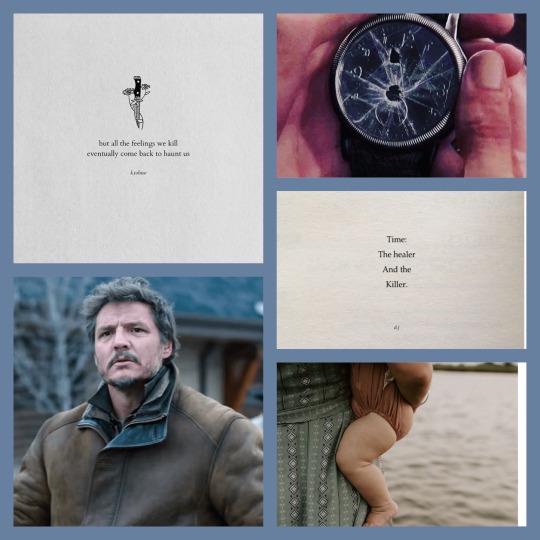
pairing: joel miller!fem reader
chapter summary: with Joel and Ellie still in Jackson, you try to navigate your confusing feelings towards Joel. warnings: small mentions of violence, angst, fluff, swearing I think. let me know if i missed anything please! also this isn't edited at all. if you know tlou and wanna beta this story, that would be lovely <3 word count: 3k masterlist series masterpost ask box tag list form
authors note: thought I abandoned this story? same. so it's been a hot minute, and I'm not sure if anyone is still interested in this story but it's been in the back of my mind and then 3k words poured out of me at work today. I'm not sure how I feel about this chapter, but I hope you like it anyways. I'll tag the people who asked, but I know it's been MONTHS so if you want to be removed from the tag list, send me a message and if you want to be added to the list, fill out this form. if you've got any questions, comments or thoughts, my ask box is here or just leave a comment in the notes:). thanks for reading, like & hit that reblog button if you enjoy it🩵
When Jack was first born, you went through a rough time. You were a new mom in a post-apocalyptic world and still trying to get over the betrayal you felt from Joel. You spent many nights at the kitchen table with Maria or Avery, crying or sitting in silence and feeling numb. The hardest nights were when you missed him, because that meant feeling weak and you hated letting yourself feel like you needed him.
Your task of avoiding him during his stay in Jackson is becoming particularly difficult because of the duckling you seem to have acquired. Ellie trails after you nearly anywhere you and Jack go and Joel has no intention of letting Ellie out of his sight for longer than a few hours. A small part of you is jealous that he seems to see the girl as a daughter when he wouldn’t even accept Jack but you can’t blame her, so you let her tag along while pretending Joel isn’t always hovering in the background like a mother hen. During movie night, you seat Jack with Ellie and go stand in the back with the adults. Brad, one of the men around your age immediately comes over and tries to strike up a conversation with you. He’s nice enough, and not hard on the eyes but you never really let yourself make time for dating. You have your hands full with your kid so you just smile politely but entertain him, listening to him talk about going on patrol but tune him out when he begins bragging about taking out a pack of clickers. You know his story isn’t true because Avery was on the same patrol as him and told you when the clickers showed up, he hid while everyone else took care of it.
At some point, you can feel a pair of eyes on you and immediately you know who it is without having to look. You’re trying to ignore it but his eyes feel like they’re burning a hole in your head so you turn to look and as you do, he quickly walks out of the building. You don’t know what comes over you, but you excuse yourself from your conversation with Brad and follow Joel outside. He didn’t go far, you find him leaning against the wall near the door a few feet away, arms crossed and deep in thought. It’s close to impossible to sneak up on him unless he’s feeling safe or is with someone he trusts. You’re apparently neither anymore because his head shoots up as soon as you get close.
He stares at you, mouth opening and closes a few times before he looks back at the ground and scuffing his boot in the dirt. You’ve no idea why you even followed him out here in the first place and after a few more seconds of silence, you start to head back inside but his voice stops you just as it did a few nights ago. He still has this invisible hold on you and you can’t understand why.
“Sarah,” he mumbles so quietly you wouldn’t have heard it if it wasn’t silent outside. “Her name was Sarah and she was my entire world and she’s gone.”
Tommy had admitted to you on one of your bad nights while he and Maria were trying to comfort you that Joel had lost a daughter. You’d put two and two together after Tommy made the memorial with Maria’s late son and the name Sarah who you knew was neither of theirs.
“Yeah,” you whisper, hating the ache in your chest you feel for him. You can’t imagine losing Jack but you don’t know if you can accept what he is insinuating. You can hear him walk towards you and you fight the urge to leave because as much as you don’t want to be around him, this is the first time he’s opened up to you.
“I thought it’d be replacin’ her,” he mumbles and you realize he means Jack. That accepting another child would mean replacing his late daughter.
You turn around to find him closer than you were expecting and take a step backwards, almost toppling backwards but his arms reach out and catch you. He doesn’t let go immediately, hands firm and steady gripping your arms exactly how you remember. For a moment, neither of you move. It’s as if you’re in a trance and it only breaks when the door flies open and Jack comes running out the door with Ellie chasing after him.
You pull away from Joel, picking up Jack when he reaches for you.
“Mama! The movie’s over,” he says and then frowns. “You were gone.”
“I came out for some fresh air.”
He grumbles and tucks his face in the crook of your neck. “‘S cold,”
You’re about to respond when Joel shrugs his thick brown jacket off and drapes it over Jack but it’s big enough that it covers you as well.
You mumble a quiet thanks, ignoring the curious look Ellie gives you both and bid goodbye to the both of them, promising the girl that you would see her tomorrow.

It was inevitable, you realize, sitting at the table listening to Jack tell Joel and Ellie a story you’d told him too often.
“And-and then the Prince saved the Princess from a huge monster who’s teeth go click click click and then they went to Fred and Bob’s house for dinner!”
You can feel Joel’s eyes on you the entire time Jack is telling them the story. He’s clearly piecing together that this isn’t just some made up story you told your son but a kid-friendly version of something that happened between you and Joel. It was shortly before you left Boston, Joel and yourself going to Bill and Franks for something. You’d been distracted because it was just after you found out you were pregnant and hadn’t told anyone yet and you turned your back for a split second while you were in the wrong place and nearly torn apart by a clicker. Joel had been furious, saying you needed to be more careful but he couldn’t have been that mad because after lecturing you for ten minutes, he’d pinned you against a tree and kissed you until you couldn’t remember your name.
It was one of the last times he had kissed you before you told him you were pregnant and then left Boston.
“Quite a story,” Joel says, looking at Jack who proudly smiles at the older man's comment. “Does the Princess have a name?”
Jack gives you a curious look and when you don’t say anything, he shrugs and looks back at Joel.
“Mama never said.”
Ellie snickers quietly, obviously also realizing that the story is based on actual events. Joel gives her a look but she doesn’t back down despite his glare. She leans towards Jack and grins.
“Do you have any more stories about the Prince and Princess?”
Simultaneously, you and Joel both say “no” a little too loudly which earns the two of you some looks.
“I think it’s time for someone to go to school,” you say, standing up and offering your hand to Jack who grumbles but climbs off his chair and requests to be picked up by you rather than walk. You know you’re probably babying him but he’s growing too quick and soon he won’t want to be carried around by his mom so you’re cherishing every moment.
You chance a look at Joel before you leave and he’s wearing the softest expression you’ve probably ever seen on him and it makes your stomach do somersaults and cheeks warm. It’s probably a bad idea, no it’s definitely a bad idea but when it comes to Joel Miller, you always made bad choices.
“You guys can walk with us if you’d like,” you say and Ellie is out of her chair before you even finish the sentence. Joel looks a little more hesitant but he still doesn’t like going far without the girl in his sight so he follows the three of you outside.
Of course by the time you get to the small school Jackson has, Jack is more than happy to go in and play with his friends. He gives you, Ellie, and a startled Joel hugs before running inside without looking back. You’re grateful that you have a place here where Jack can have as close to a normal childhood one can have in this world. You can’t imagine if you’d stayed in Boston what kind of upbringing he would’ve had. You certainly don’t miss it there, aside from the nights you missed Joel which were far and few in between up until he showed up here. The reason he’s here is still unclear although you have a suspicion Tommy knows more than what he’s told you and even Maria. The length of Joel and Ellie’s stay is also not known. You were expecting them to just need to stop and get supplies before continuing their journey but they’re still here and you have no idea when they’ll be leaving.

You’re not sure what possessed you to invite Joel and Ellie to your little house for dinner but here you are, chopping vegetables to make soup. Jack is still at school and the soup will take time to cook but Ellie insisted on helping you prepare it and Joel said he needed to go see Tommy. It’s kind of nice to have company even if it’s in the form of a fourteen year old. Said fourteen year old has been awfully quiet the past twenty minutes and you can tell she’s wanting to ask you something but is stopping herself.
“Go ahead,” you eventually say, tired of her silence.
“Joel is Jack’s dad, isn’t he?”
You’re so tempted to say no, only for the fact that she obviously looks up to Joel and you don’t know who she would look at as the bad guy. And honestly is the best policy, right?
“Yeah,” you tell her, noticing when her shoulders deflate.
She’s quiet for another five minutes before asking, “Did Joel tell you to leave?”
You’re quick to answer this question because as wrong as what Joel did was, it was your decision to leave Boston and you don’t want to put some wedge between them.
“No, I left because I wanted a better life for Jack.” It’s not a complete lie, Joel is part of why you left but you really did want a better life for your son than what he would’ve had in Boston.
“Alright,” she eventually says and then: “Can you pass me another carrot?”
And that’s that. You both chat about random things, she tells you some terrible puns and you buckle and reluctantly tell her some more stories of when you, Joel and Tess lived in Boston. She tells you that Joel won’t talk about Tess and she feels guilty about her death. You listen quietly, letting her spill out things she must have been holding in knowing Joel didn’t want to hear it.
“I knew Tess really well,” you tell her. “She wouldn’t have done what she did if she didn’t think it was worth it.”
Ellie looks at you hesitantly. “Yeah?”
You nod and she smiles a little before asking if she can come with you to pick up Jack, but you tell her that Avery is going to pick him up and drop him here. Since you’ve got some quiet time, you decide to do some cleaning while Ellie goes to the house she and Joel have been staying at to take a shower.
It’s a couple hours later when there’s a knock on your door and you’re figuring it’s Avery with Jack so when you open the door, you almost drop the broom you’re holding when you see Joel standing in front of you and Jack in his arms. You start to ask why Joel has Jack and where Avery is when you see the woman in question standing at the bottom of the stairs with a sheepish smile on her face.
“We, uh, ran into Mr. Miller on our way here and Jack insisted that he come with us,” she explains but you can’t stop looking at the duo in front of you. Jack is smiling, arms wrapped around Joel’s neck and telling him a story but Joel is watching you warily, like he’s expecting you to yell or something.
“Hi mama,” Jack says but makes no move to leave Joel’s arms. In fact, he looks very pleased that the older man is carrying him.
“Hi baby,” you reply, unsure what to do. You don’t want to upset Jack by taking him from Joel but you can’t tell if the latter is uncomfortable. Avery, sensing the tension, smiles brightly and waves awkwardly.
“I gotta go feed Lucy,” she says, already walking backwards. “See ya, Jack!”
Jack shouts goodbye to Avery and you finally snap out of your stupor, stepping back to let Joel walk inside. He toes off his boots and you’re about to offer to take his jacket when you realize he’s not wearing one because you never gave him it back last night.
“Dinner smells good,” he says, following you to the living room where Jack finally wriggles out of Joel’s arms but only to get a toy to show him.
“Look Mr. Miller,” the boy says, offering a wooden train that you gave him for his birthday. An older gentleman in the town made it for you after hearing Jack talking about how much he loved looking at pictures of trains.
“That’s a really nice train,” Joel compliments, sitting down on the couch. Jack immediately climbs up and settles down next to him, chatting about the toy and you watch as Joel listens intently, nodding at the right times and you remember that he’s done this before, it may have been twenty years ago, but he’s dealt with an excited almost five-year-old.
The front door opening and closing tears your attention away from them and you look to find Ellie walking towards you, shrugging off her jacket. She lays it on the rocking chair and then plops down next to Jack, shooting you a small smile. There’s something in her expression that is sadder than when she left and you wonder if something happened since she left but you don’t bother asking her now. Instead, you go set the table and check the soup to make sure it’s done before calling everyone to the kitchen. Jack makes sure his chair is as close to Joel’s as he can get it so he can keep talking to him.
You have heavily conflicted feelings about the relationship growing between them. On one hand, it’s kind of nice that Jack is getting to know his dad, even if he doesn’t know Joel is his father. On the other hand, if you let Jack get too attached to Joel, it’ll break his heart when he and Ellie leave. So, you decide tonight after Jack is gone to bed and Ellie goes home, you’ll sit Joel down and ask him why he’s here and when he’s leaving.
Of course that doesn’t happen because Ellie and Jack pass out on the sofa after reading every children's book you own and you and Joel end up sitting at the table, drinking some liquor Maria had given you that you never got around to drinking. You’re not drunk, but you’re tipsy enough that you feel relaxed around Joel and laugh at whatever he’s saying. It almost feels like Boston, when the days were so long and dark that all you wanted to do was sit and drink with him and eventually wind up in bed together.
Except now, you’ve got two kids who are sleeping in the living room and no intention of going to bed with him. Well, maybe if you let yourself have a few more glasses and if there weren’t kids in the other room but that’s just the alcohol in your system making you think things you shouldn’t.
“Do you remember when Frank asked how long we’d been dating?” He asks and you snort at the memory. You didn’t know at the time why Frank would even think that since you and Joel had been bickering the entire time you were at dinner, and Tess had to tell the two of you to knock it off multiple times. She had choked on her water when you asked why Frank thought you were dating and he said that it was because the two of you reminded him of Bill and himself.
“Yeah, Tess nearly choked because she was laughing when we simultaneously shouted no and then Bill caught us making out behind his house,” you say, smiling behind a sip of your drink. He doesn’t react to you saying Tess’s name and just shakes his head with a hint of a smile tugging at his lips. He tilts his head a little so he’s looking at you and not the ceiling.
“If I thought it covered the pain I caused you, I’d say sorry,” he says quietly and a little broken.
You look away, swallowing loudly. “Well, sorry would be a start.”
You don’t say that you’re not sure if you can forgive him, even if he did say sorry. Even if he knelt in front of you and begged, you’re not sure if you could push past the last five years. Every night you spent sobbing into your pillow in Boston while you waited for him to come back after you told him you were pregnant. Every bad night you had here in Jackson, thinking of why he did it.
“I’m sorry,” he whispers softly, like it’s a secret.
Blinking back tears, you clear your throat and nod. “Thank you.”
Thank you but I can’t forgive you, goes unsaid. But a little voice in the back of your mind whispers, I can't forgive you yet and you can’t help but believe it a little bit.

tag list: @sloanexx @wandering-poetess @o-sacra-virgo-laudes-tibi @chiogarza @jellybeanxc @iranispunk @imonmykneessir @wakaladjarin @sleepylunarwolf @pedropascalfan221 @abovenyx @starjoyyy @shuriri4life @cavillary @absolukeyrh @uwiuwi @keileighr @whitemanshoe19 @mishasminion360 @variety-is-the-joy-of-life @praline357 if you wanna be removed, please let me know <3 i know it's been awhile!!
#allies writing#joel miller imagine#joel miller x reader#joel miller x you#joel x reader#joel miller fanfiction#joel miller fic#joel miller x y/n#the last of us fanfiction#the last of us imagine#tlou x reader#tlou fanfiction#joel miller reader insert
128 notes
·
View notes
Note
OOH OKAY FOR HORROR BOOKS RECOMMENDATIONS!
I am i got to admit mostly a YA reader but don’t let that hold you back. I will put the age behind it. Also for other recommendations i vouch for House of Hollow. One of the most horrifying and most satisfying ending reveals.
- Plain Bad Heroines by Emily M Danford (Adult) This one is long and has some tumblr/internet culture references and poly engame, but I am one of the few people who liked it. Multiple timelines: one about the tragic death of teenage girls by wasps and more importantly the older teachers complex relationships with each other and a new maid and a current timeline about the adaptation of the events on a seemingly cursed filmset. Including footnotes drawings and an almost full cast of woman into woman. I liked the stylistic choice
- Extasia by Claire Legrande. (YA) Plot-twist filled post apocalyptic religious Dystopia were a girl is raised as punishment receiver, when she discovers a secret group of witches. So many cults and as i said very twisty
- Where echoes go to die by Courtney Gould (YA and more thriller as the horror is in the suspense and uncalley valley aspects. A young lesbian visits the town her mom got obsessed with before her death, only to find out there is a centre that offer miraculous treatments
- Summers Edge by Dana Mele (YA). Again between horror and psychological thriller. A group teenagers in three timelines visit an summer house, when spooky shit starts to happen. One after a tragic accident, one two year before that and one the year it happened.
- Not good for maidens by Tori Bovaltino (YA bit slow at times. Inspired by globin market. Again two timelines. In one a young girl falls for a female goblin in another a girl saves her cousin from the goblin market)
- Chlorine by Jade Song (psychological horror, Adult): basically a study of this traumatic bisexual Asians woman lives till she becomes a “mermaid”
- Last tale of the flower bride by Roshani Chokshi (YA and more psychological thriller than horror) : two timelines: a man is spiraling his wife is hiding something visiting her family home meanwhile in the past two girls become closer and closer till their delusions might be a bit too real
- All these sunken souls (YA anthology by Black authors and has some bangers)
- My darkest dearest by Kayla Cottingham (YA girls make deals with this female demon underneath their school)
- The Book Eaters by Sunyi Dean (adult handmaiden tale ish. A vampiric book eating aliens life to forced marriage to make sure they don’t die out, until her son is a braineating vampire and she has to run away with him)
- House of Hunger by Alexis Hemderson (Adult, woman to survive poverty sells herself as blood maiden to rich people who drink blood)
- The memory eater by Rebecca Mahoney (YA and more fabulism with horror aspects. A girl is raised to keep the towns memory eating monster imprisoned, till it escape and has apparently eaten her memory too)
Also these adults horrors I have on my radar but not read yet so worth checking out:
- Last to leave the room by Caitlin Starling (she actually wrote a lot horror)
- Our wives beneath the sea by Julia Armfield (also Private rites)
- Bloom by Delilah S Dawson
- They Drown Our Daughters by Katrina Monroe
- Patricia Wants to Cuddle: Samantha Allen
Wow what an extremely detailed and long rec list thank you! Many of these sound interesting, I will be sure to come back to this next time I go to the bookstore lol!
14 notes
·
View notes
Text
Book recs: vampires
Listen, vampires are a classic for a reason, but they have also been done to death (pardon the pun) to the point that finding books that are creative with the premise can be a bit of a slog through tired old tropes. Hopefully this rec list can be to a bit of help for all vampire fans out there wanting something fresh!

For details on the books, continue under the readmore
Previous rec posts:
Really cool fantasy worldbuilding
Really cool sci-fi worldbuilding
Dark sapphic romances
Mermaid books
Sci-fi vampires:
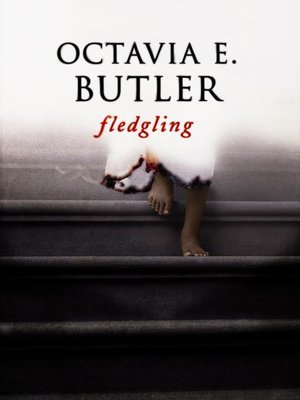
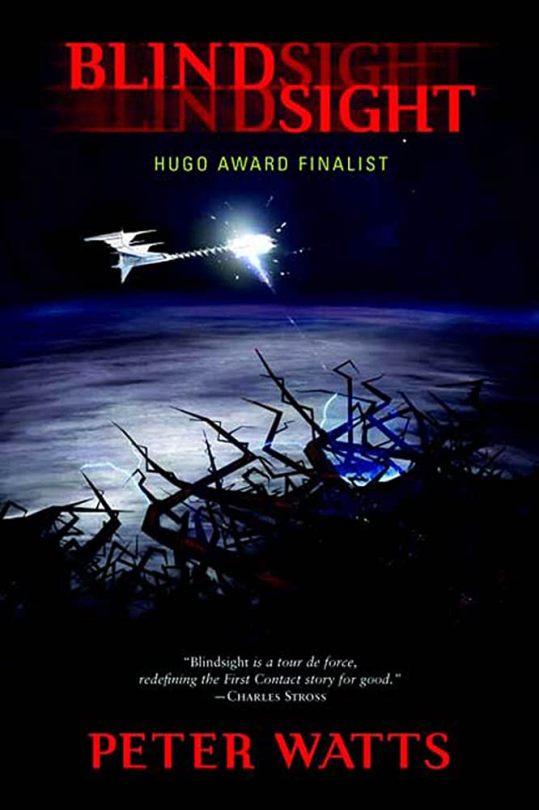
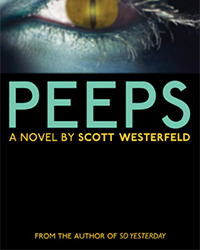
Fledgling by Octavia Butler
Octavia Butler my beloved, literally you cannot go wrong with one of her books. Fledgling follows what at first seems to be a ten-year-old amnesiac girl, who finds out she is in fact a decades old vampire on the run from others of her kind. The vampires here are a separate species from human, not supernatural, and are as a whole very fascinating and unsettling. Come in prepared for fucked up power dynamics.
Blindsight by Peter Watts
Vampires and aliens and questions of the nature of consciousnesses, oh my. Not a vampire novel so much as a scifi novel about aliens in which there also happens to be vampires (one of which is captain of a spaceship sent to explore an alien ship just entering the solar system). Another example of vampires as an entire separate species, but more horror focused than Fledgling. No, seriously, this book will fuck you up, highly recommend if you're okay with a lot of techno babble and existential horror.
Peeps (Peeps duology) by Scott Westerfeld
Young adult. Vampirism as a sexually transmitted parasite that turns most people into bloodthirsty monsters. Cal is an asymptomatic carrier working to find other infected before they hurt people, including his own former girlfriends. But there is something else lurking in the dark, an ancient enemy of the vampire parasite...
Post apocalypse vampires:
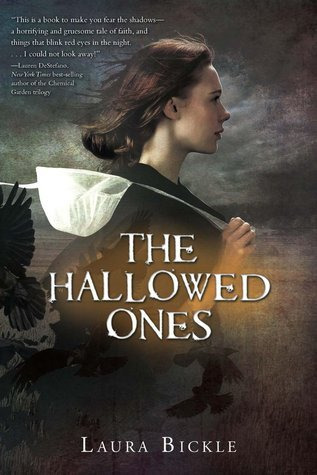
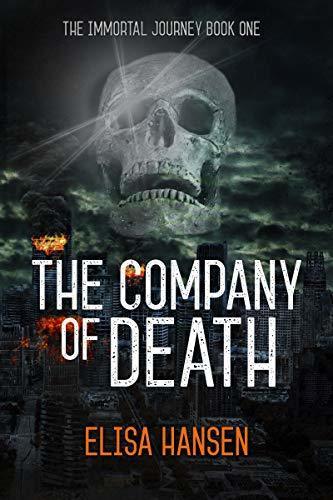
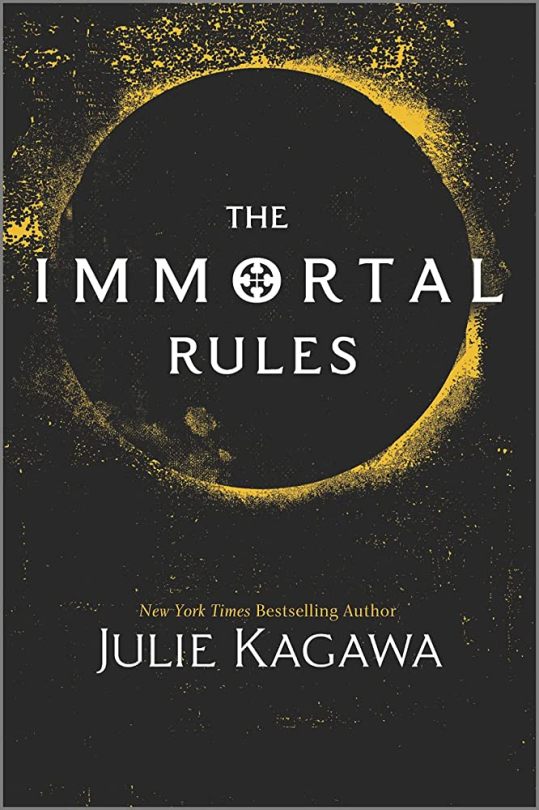
The Hallowed Ones (The Hallowed Ones duology) by Laura Bickle
Young adult. Katie is an Amish girl eagerly awaiting her rumspringa, when she gets to try out the outside world. But before she has the chance, something happens to the Outside; a nearby town is wiped out, and something evil stalks the night. To protect their community, the Amish elders decide that no one can leave and no one can enter the sacred ground that makes up their home. That is, until Katie finds an injured young man and decides to help him.
The Company of Death by Elisa Hansen
Wild mix of genres, where a zombie apocalypse has struck and vampires gather up humans to keep their food source from going extinct, a robot travels across America with a young man she's tasked to keep safe, and former-vampire-hunter-recent-zombie Emily teams up with Death himself to stop the apocalypse. Features bi and ace characters! Bonus rec: the author also runs the youtube channel Maven of the Eventide, where she talks about various vampire media. Check it out!
The Immortal Rules (Blood of Eden trilogy) by Julie Kagawa
Young adult. Another zombie apocalypse (well; feral vampires) scenario in which vampires gather humans up to keep their food safe. Allison Sekemoto hates vampires, but when she ends up on the brink of death and is offered a way out, she has no choice but to take it. Hunted by a mad vampire and forced to flee the relative safety of her city, Allie must enter the post-apocalyptic outside world and team up with the free humans roaming there, seeking a cure for the undead plague that ravages the world.
Urban fantasy vampires:
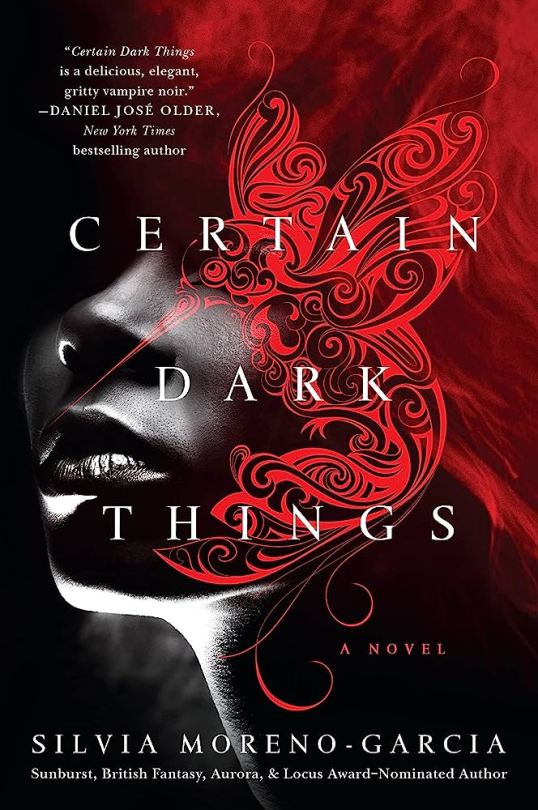
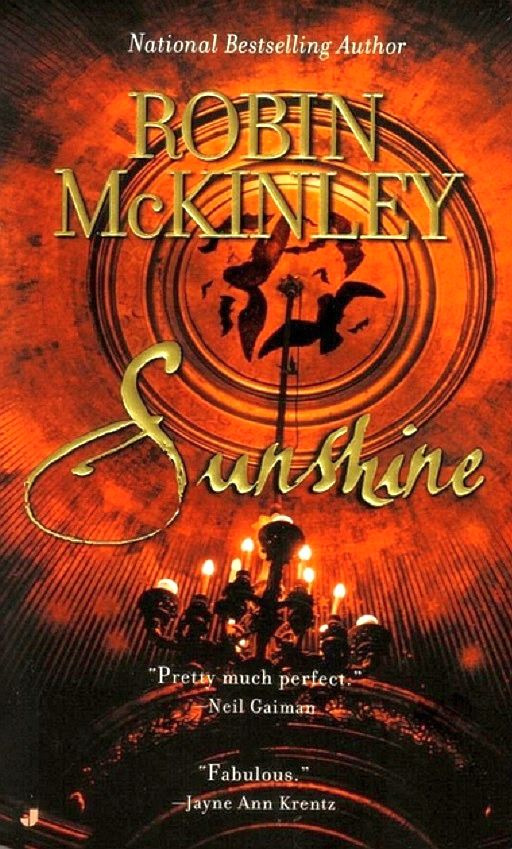
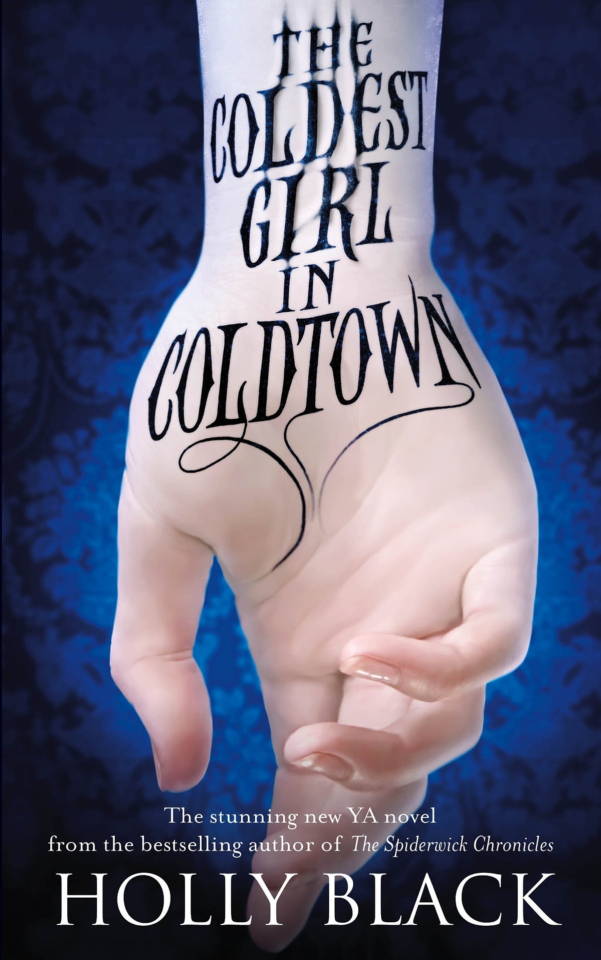
Certain Dark Things by Silvia Moreno-Garcia
Queen of fucked up gothic horror, Silvia Moreno-Garcia, comes for vampires in this gritty novel following Domingo, a garbage collecting street kid in a Mexico City where vampires walk the streets. His life gets turned upside down when he meets Atl, a vampire descendant of Aztec blood drinkers who’s on the run and needs all the help she can get.
Sunshine by Robin McKinnley
Urban fantasy on a level of its own, where dangerous magic exists alongside humans. It keeps you guessing and much is left unexplained; if you want clear answers and explanations to everything you might be disappointed, but if you want a world that feels mysterious and dangerous and lived in you'll probably like it. It follows a baker who, after getting kidnapped by vampires, gets embroiled in a dangerous struggle and has to team up with one of them to survive. The vampires here are really inhuman and unsettling.
The Coldest Girl in Coldtown by Holly Black
Young adult. After vampirism swept the land, special Coldtowns were built to quarantine anyone bitten, whether they have turned or not. After having survived a massacre at a party in which her ex-boyfriend got bit, Tana sets out with him and mysterious vampire to reach the nearest Coldtown, not knowing if she’ll ever be able to leave it again.
Modern vampires:
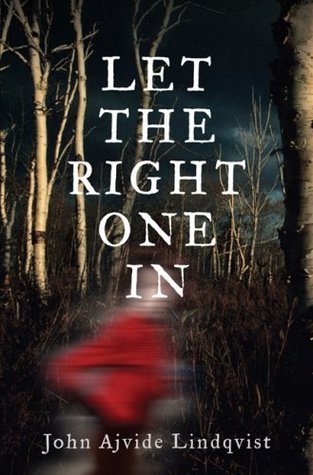
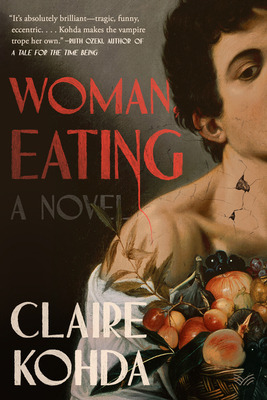
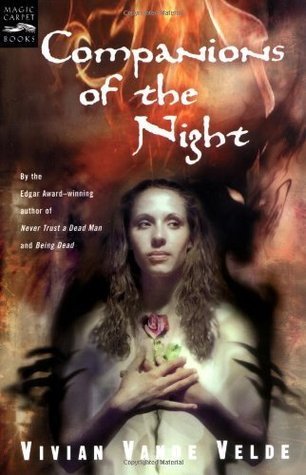
Let the Right One In by John Ajvide Lindqvist
Swedish literary novel set in the 1980s. Follows twelve-year-old Oskar, a troubled and bullied boy who befriends his new neighbor, Eli. But there’s something strange about Eli, such as her only coming out at night. Also available as two separate movie adaptations (I highly recommend the Swedish original; the American remake is perfectly adequate standard horror fare, the original is a masterpiece).
Woman, Eating by Claire Kohda
Literary novel following Lydia, who’s grown up as a vampire under the thumb of her mother, who’s been obsessed with self-hate over their existence as blood drinkers. Finally on her own for the first time in her life, Lydia moves to London hoping to make it as an artist. But surviving alone as a vampire is harder than expected. Slow and fairly light on plot, but utterly captivating.
Companions of the Night by Vivian Vande Velde
Young adult. After Kerry saves a young man from three attackers who claim he's a vampire, she's drawn into a dangerous game and forced to work with a manipulative vampire. Pre-cursor to the modern ya vampire genre, Companions of the Night utilizes many of the same tropes but in very different ways, making it a unique experience.
Historical and fantasy vampires:

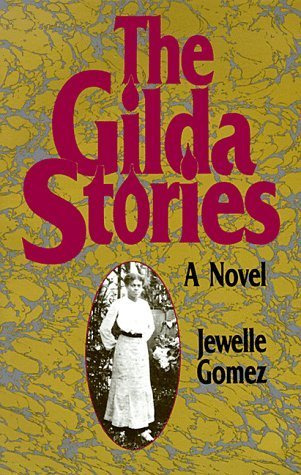
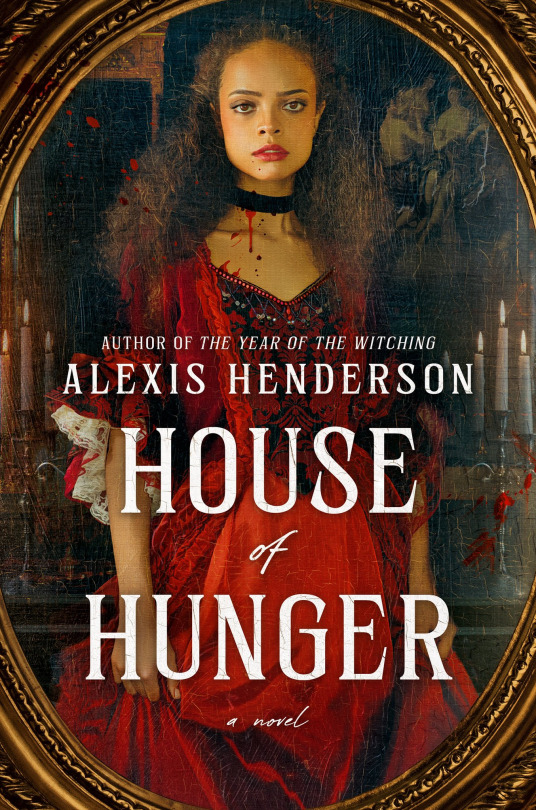
A Dowry of Blood by S.T. Gibson
Dracula inspired novella, following Constanta, who’s turned from a medieval peasant to an undead bride. As time passes the relationship between Dracula and Constanta grows all the more strained and potentially dangerous. Teaming up with his two other consorts, she seeks to unravel her husband's secrets. Sapphic and polyamorous.
The Gilda Stories by Jewelle Gomez
Having escaped from slavery in the 1850s, young Gilda is taken in by a vampire, and eventually finds herself turned as well. Consists of a series of novellas following Gilda throughout the centuries, from the past to the present to the future. It’s also sapphic!
House of Hunger by Alexis Henderson
In a world where the rich drink blood to preserve their health, Marion applies to a position as bloodmaid in a notorious noble house far from home. Suddenly showered with luxuries and debauchery, Marion soon gains the interest and favor of Lisavet, countess of the house. A fresh take on the idea of vampires and deliciously dark sapphic romance.
Bonus AKA I haven't read these yet but they seem really cool

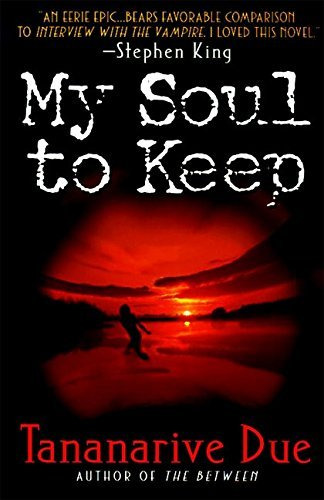
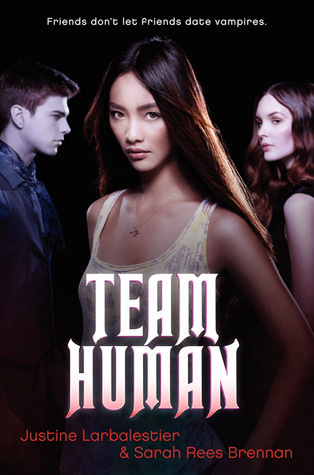
The Hunger by Whitley Strieber
Ancient vampire is on the hunt for a new partner, none of which tend to last long.
My Soul to Keep (African Immortals series) by Tananarive Due
I keep seeing this one described as a vampire book, and once stumbled on the description "almost a vampire book" and listen by now I'm simply curious to see what it's about.
Team Human by Justine Larbelestier & Sarah Rees Brennan
Young adult. As far as I can tell, a satire on typical ya vampire romances.
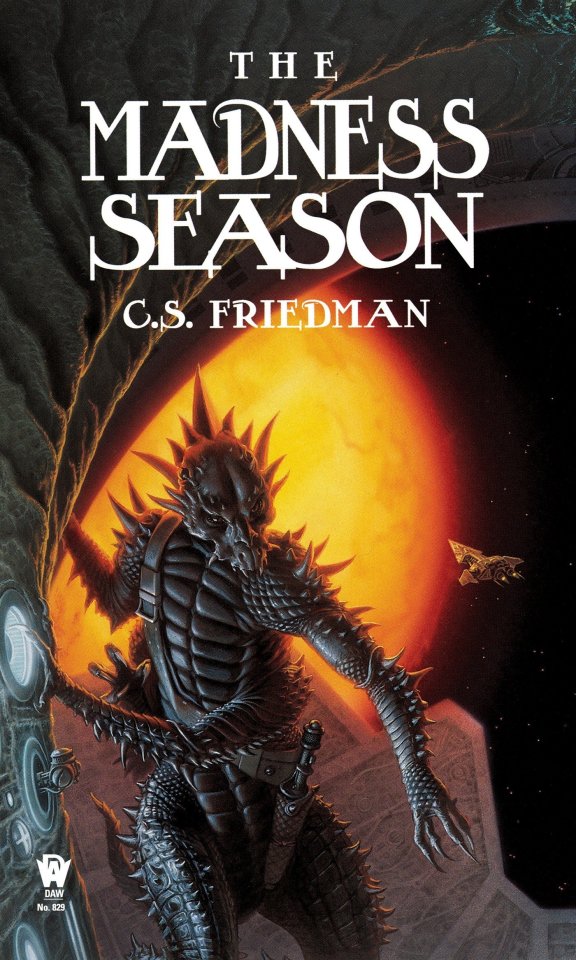
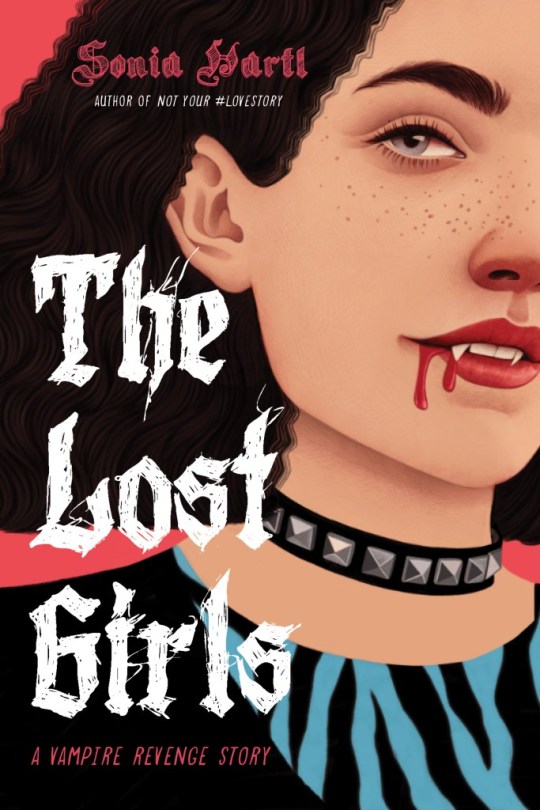
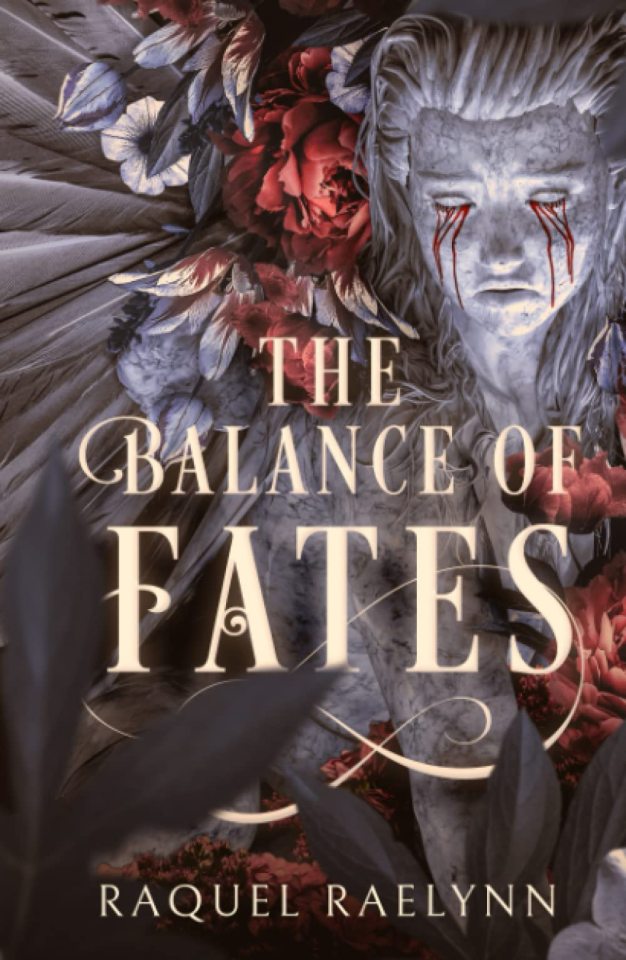
The Madness Season by C.S. Friedman
*chanting* vampires in space vampires iN SPACE
The Lost Girls by Sonia Hartl
Young adult, sapphic. Three vampire girls turned and abandoned by the same vampire get together to stop him from turning yet another girl.
The Balance of Fates by Raquel Raelynn
Young adult, sapphic. A girl enters a competition against vampires and werewolves, complicated by her feelings for one of her vampire competitors.
#hello new critrole followers! i sometimes write book recs!#vampires#book recs#nella talks books#portal fantasies next time!#might be longer than a week tho#there are a couple of books i want to check out first to see if they qualify#(just gave up about nora roberts the awakening; it does NOT qualify)
125 notes
·
View notes
Text
1- What's the name of your AU if there is one? If no official name what would you call it?
Time Variant Authority/ Time Travel AU
2- What is the most prominent differing factor between your AU and the original source Material?
Time travel was discovered by The Creator, though he deemed it too powerful and catastrophic to use. Eclipse got his grubby little hands on it and just had it. Monty discovers it and is the first to use it.
3- What is your favorite character in the source material and who's your favorite character within your AU?
In canon I Miku is my favorite character xD, I just like the chaos she brings. In this AU my favorite character in this is Eclipse. He's more of an evil Solar actually and that's what's interesting to me.
4- Are any of the characters in a relationship (QPR, Romantic, Emotional, ect.)? If so what are the most defined ones you've built so far, and within the universe how did their bond come along?
There are canon romantic relationships. But I go into Eclipse's relationship with Puppet a lot, we see how they fell apart by his actions when he's time travelling. Monty and Moon's relationship is vital to the story, Moon is a kind of key character to the universe itself.
5-What 'fanfic tropes/fanfic tags' does your AU use?
Uhhhhhh I have no clue.
6-Do any characters within your AU have any disabilities (mental or physical)?
Monty has ADHD, Sun has anxiety and OCD, Moon is "eccentric", Eclipse is a sociopath, and Puppet has PTSD. Uhh idk what else.
7- Do any characters have familial bond amongst eachother? If so how strong are their bonds, and how did they come about?
The family bond is very important to this story. Eclipse is Lunar's father in this so their relationship is important. As the AU progresses Eclipse becomes addicted to time travel and the power he has being able to change time itself, he ends up isolating himself from Lunar and the rest of his family.
Sun and Moon were made by Creator, separating made Eclipse, he made Lunar, Earth is made by Creator. Bloodmoon and KC were never made/born, instead Moon, Eclipse, and Lunar have parts of the homicide code.
8- What are the ages of the characters in your au? Or are the ageless/immortal?
Robots (for the main variant of this AU). Everyone is adults except Lunar.
9- what's the general world like? Is it futuristic, modern, apocalyptic, post-apocalyptic, does it take place mainly in a coffee shop or something of the sort?
Starts out in the Pizzaplex, they're just doing their jobs. Moon dies actually, Monty time travels Eclipse follows him. Eclipse keeps doing it, changing the dimension as he pleases.
[Moon never invented portal travel, or doesn't until later. So nobody knew there were other dimensions, it was kinda just a theory Moon had.]
10 - are you working on any fanworks (fanfic, askblogs, rp blogs, animation, comics, ect.) about this au? If so link them!
I'd like to make a comic-type thing for this, but it will mostly be written out and released on Wattpad and AO3.
11 - What is the worst thing(s) that happened to a character(s)? Did they have a tough life, a loss, or anything of the sort? If so what? How did it affect them?
It starts out "happy". In the way of there isn't the craziness and adventures the canon has. There's just the Pizzaplex. I'll explain later in the story how the homicide code was an important thing earlier but is no longer as much anymore. Moon never fully trusts Eclipse, especially around people.
12 - what's the best thing(s) that happened to a character(s)? How did it affect them?
Uhhhh July 16th never happened. So yay. Maybe I'll add an adult Evelien. Creator doesn't appear as bad as he is in canon.
13 - Did you take any unique design choices for any of the characters? If so describe or show them off!
I plan to draw but for now have Gacha designs (the designs can/ might change)
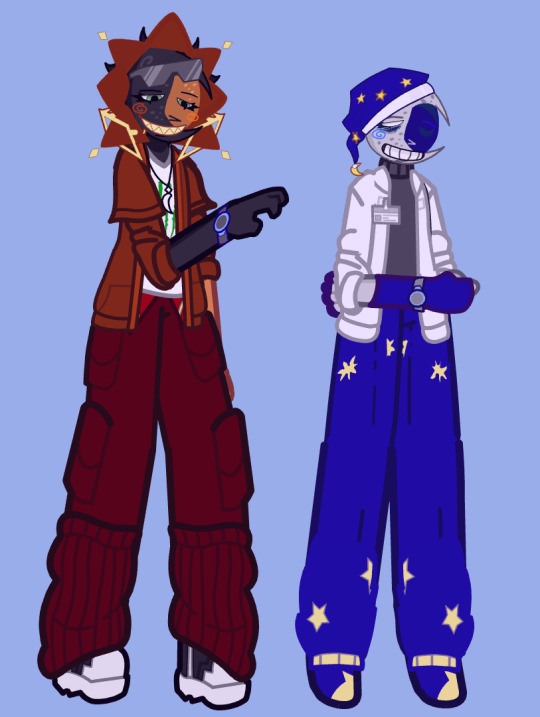
14 - What character(s) in the AU have been worked on and built up the most and what are they like?
Eclipse is the main character, and kind of the villain in the story. I go into Lunar a lot too.
15 - What is your least favorite character in the source material, and what's your least favorite character in your au?
Vegeta. I love him, but I hate him. He's so cringe. Probably in the AU too, because I need some chaos.
16- Is there any major personality changes you made to the characters?
Lunar mostly. He's considered a kid but he matures a lot throughout the story. He's a lot more like his dad than he should be.
17 - What is the most 'out of character' thing in your AU?
Idk I try to keep them pretty close to the original scouse material?
18 - How long have you been working on this AU?
A few days tbh xD.
19 - Is there any OC's or self-inserts? If so what are they like and how do they affect the story?
I don't use OCs in fanfiction media.
20 - What inspired this AU?
There's somewhere in an Astral Spiff video (I think in a few) where he explains when doing tasks out of order in SB you have to be careful to not skip one of Moon's segments or he jumpscares you. That's been called TVA Moon, and the inspiration for this AU.
21 - Has your AU steered off of your original plan for it at all? If so do you like how its changed? If it stayed the same what's the base idea for it exactly?
I accidentally started writing it as a Human AU variant, so throughout the story you see two parallel dimensions. Both the Eclipses will technically meet.
22 - Do you have any variations of this specific AU? If you do how do they differ amongst eachother?
Oh. Well, yeah, the human variant. And later when you're at the TVA you see hundreds of people time travelling.
23 - Does this AU bring you comfort/was it made for comfort?
No. It's very angst heavy. It starts with Moon's death, there is nothing comforting about this.
24 - Is this your only TSBS AU or do you have any other ones? If other ones is this one your favorite?
I have a bunch. I mostly write for my Main Human AU. I enjoyed working on it.
25 - What parts of the AU are you proudest of?
The reveal of TVA Moon. He just throws Eclipse on the ground and drags him through a portal. It's really funny, and the whole AU has always been about him even tho we follow Eclipse.
26 - Do you keep this AU mostly private to yourself? If so why?
No. I just have only been working on this for a few days lol.
27 - would you consider this AU to be dark, light, fluffy, or what would it fall under and why?
Dark probably. It's got angst, Eclipse destroying his life and dimension, hurting his family. Yeah :P
#sun and moon show#sams#fnaf#tsams#fnaf security breach#security breach show#the sun and moon show#sams au#tsams au#TVA AU#sams eclipse#sams moon#tsams eclipse#tsams moon#eaps eclipse#teaps eclipse
9 notes
·
View notes
Text
Daijiro Morohoshi: The Black Ships of Manhattan


Fellow people on Tumblr, I have just had an exceptionally surreal experience, and I would like to share it with all of you, particularly other Americans.
I have seen people joke before about what it might be like if another country depicted the United States in a work of fiction with the same wild caricatures and stereotypes as we do other countries, and in some ways this is that story. Granted, I have seen other examples before, but I don't think I've seen anything quite like this.
Perhaps the weirdest part is that, aside from the translated manga itself, I can't find any additional information about it in English anywhere on the internet, at least not after an hour of furious googling. Articles exist about the author and some of his work, but none of them mention this exact story. I can't even find anyone talking about it on forums or social media. And in this particular moment of exceptional American insanity, I simply feel compelled to show it to as many people as I can.
Folks, this is going to be a long one, but I promise it's worth it.
So. This is a manga short story by Daijiro Morohoshi, who is very well known in Japan but almost completely unheard of in America. He has, however, influenced Japanese creators who are famous here, such as Hayao Miyazaki, Hideaki Anno, and Rumiko Takahashi.
The story was published in a collection called Paradise Lost in 1988, which you can read online HERE at the same place I did. It is an anthology of bizarre science fiction tales, and there are six stories that come before this one. The title story is a highly allegorical two-parter set in a post apocalyptic landscape that looks like the covers of a dozen pulp sci-fi novels come to life. Adam's Rib and Landscape of Men both have themes of "women are terrifying monsters who will drain men to empty dessicated husks, and the men kind of deserve it" and read exactly like something you'd find in Galaxy Science Fiction in the 50s. Chastity's Wreck feels like something Wally Wood might have drawn for an adult magazine, with the nubile astronauts of Project L.A.D.I. hunting the universe for hot alien hunks. Bio City is a potent body horror tale about a strange alien virus that causes all animal life and anything made of metal to melt together into one super-organism. The Call tells the story of a Japanese civil servant who is suddenly transferred to the "Earthquake Prevention Department," where he is given cushy work and a massive salary for one year, then sacrificed to a pagan god.
And that finally brings us to Black Ships of Manhattan, where things get really wild.


Presumably inspired by the "Black Ships" that brought Westerners to Japan between 1543 and 1858, the story begins sometime in the 1980s, when the United States abruptly adopts a completely isolationist policy, elects a President-For-Life, and starts their own calendar. 100 years of cultural stasis later, Japan - which, like the rest of the world, has grown far more technologically advanced - makes contact with the strange, isolated land, and attempts to bring the outside world to America.
It, uh, doesn't go well.

After first contact, the Japanese ambassadors demand a trade treaty, and the US is quickly split between Anti-Isolationists, who want to reopen contact with the outside world, and Expultionists, who oppose any foreign presence in America. We are also treated to some spectacular "American" names such as Tock Gowan, E. Common, and Kirk Cashew. An Expultionist extremist group attacks the Japanese residents (drawn in curiously racist caricature by the Japanese artist) of a trade post off the coast of San Francisco and kick off a war, in which the woefully-outmatched Americans are swiftly crushed. Anti-Isolationist support takes over in California and the treaty is signed, but it is against the President-For-Life's will, while unrest and violence continue to rage between the opposing American factions. At a protest, an Expultionist assassinates the Vice President with a grenade.
Meanwhile, a Texan Cowboy™ adopts the sole survivor of a Japanese passenger plane shot down by Californian forces, and that's where our story really begins.

The cowboy is Leo Sacamondo, a dedicated Anti-Isolationist. He hopes to form an alliance between California and Florida to turn against the government in Washington, and also to bring the orphaned boy to New York, where he can find safe passage on a Japanese ship.
In New York, the Japanese ambassador, now Consul, makes observations about the local culture - such as how the TV plays state-sponsored messages from the President-For-Life every fifteen minutes reminding all citizens to wear their "Democracy Machines." In California, an Expultionist leader watches one of these broadcasts before committing ritual suicide with an automatic rifle.

In Washington, the Consul tries to meet with the President-For-Life, only to be repeatedly denied access. In New York, special police roam the streets, searching for Leo and the orphaned boy. Leo reveals to the boy that the "Democracy Machines" are a direct connection to the "United Computer" in Washington, but claims that all "true patriots" no longer wear them.

The Consul manages to convince one of the President's staff to grant him an audience, and is taken to the White House, which is surrounded by tanks and completely stuffed with outdated computer circuitry - so much so that there is hardly any room for people.

Despite persistent rumors, the President's aide insists that the President himself is not a computer, and takes the Consul through a secret passage to the President's true dwelling in the Capitol. While Leo hides from the cops in a honky-tonk bar playing patriotic stage shows, the Consul learns the truth: the President-For-Life is a massive, formless, energy being, the "accumulation of the psychic energy of all Americans" transmitted through the Democracy Machines.

Leo explains to his allies that a century of cultural stagnation has severely weakened the psychic energy being transmitted to the President, that the President has in turn been harming and controlling the citizens in an attempt to siphon more from them, and that "the Will of America is a dictator that must be overthrown!"
At the same time, the Consul confronts the President over these very issues, and goes on to assert that by clinging to isolationism it has harmed all Americans, and is no longer serving their best interests.

In New York, the special police find and raid Leo's hideout, shooting wildly into the crowd. In Washington, the President remains steadfast against the Consul's scolding, but suddenly starts to panic when he realizes that California has disconnected from the central computer. The revolution, it turns out, has already begun.
Muttering slurs, the President transforms into a giant Superman with a "P" instead of an "S" and smashes through the roof of the Capitol.


Leo and the orphan manage to escape from the cops, and discover crowds of people dancing in the streets as they are freed from the President's control. Super-President arrives to ruin everyone's fun and orders the crowd to disperse, but his control is already waning and nobody listens to him, thanks to the California-Florida Alliance.


Unable to accept his loss of control, the President declares "Fuck the people!" and possesses the Statue of Liberty Tyranny in a last-ditch attempt to destroy the Black Ships.


The President is destroyed and vanishes in a flag-shaped explosion. Leo declares the battle over and looks forward to a new, better America. Before he can celebrate victory, however, one last cop appears and kills him.
As Leo dies in the orphan's arms, they look out at the Statue of Liberty, sinking in the water, shot in the heart, clutching at nothing, and America dawns. The End.


So yeah.
To be honest, I'm not entirely sure how to feel after that. Like, I'm pretty sure I understand the story, but I really can't emphasize how strange it feels to have just stumbled across it like this. It's 36 years old. It is and it isn't about things that were happening then and still happening now. It's a parody. It's dead serious. It's weird as fuck. And as far as I can tell, quite literally nobody is talking about it (in English in a place where I can see). I feel like I stepped into a fairy ring.
So here. Have this. please show it to other people. I don't feel confident enough to offer a complete analysis, but here is my best summary and you can make of it what you will. I would actually love it if this post got tons of attention and mutation. I've always believed in the power of narrative, and this seems like one worth talking about. And if anybody knows more about this than me, by all means please share.
America is counting on you.
#manga#science fiction#alternate history#america#japan#isolationism#politics#racism#war#guns#violence#death#suicide#general nightmare stuff#what did i just read#daijiro morohoshi#the black ships of manhattan
12 notes
·
View notes